
Past Events
︎ ︎ ︎ ︎ ︎
HOME / MANIFESTO / UPCOMING
EVENTS / MEDIA / PAST EVENTS / STORE / ABOUT
Excuse me, Žižkov
June 12th 2021 @ Albert Grocery store, Olšanské náměstí︎ Photos by Eduard Germis, Hunter Andrews, and Jan Černy.
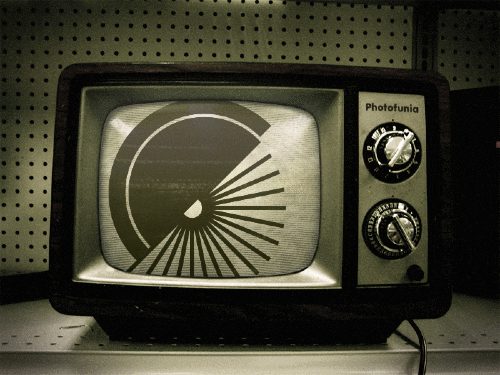
The title of the event, Excuse me, Žižkov, was selected to show our gratitude and respect to the Prague cultural scene as we would step back into it, parting our ways passed months of isolation and back into the public sphere.
The happening was carried out in multiple languages and modes of expression; local musicians, performers, writers, and audience members gathered to create a spontaneous language, sound, and action happening which not only caught the attention of residents & attendees but eventually the police, too.
![Event Flier, Excuse me Žižkov]()
Excuse me, Žižkov was our sixth OBJECT:PARADISE happening and our first event of 2021 due to Coronavirus restrictions. The performance was composed of both Czech & International residents and students, unified by the common goal to bring life back to the streets through the OBJECT:PARADISE Manifesto.
Originally planned to be held at the iconic—or infamous—Žižkov steps below the Lipanská tram stop (Rokycanova & Chelčického), 30 minutes before the start of the event, we were met with a torrential rainfall coming north from Vinohrady.
![Photo by Hunter Andrews]()
Lenka Bodnorová scurried down the stairs under the slaughter of rain with found furniture, an oblong table for example, and other obtuse kitchen items that she had planned to haul up and down the stairs and around audience members during the event—which was now threatened to be canceled.
At the bottom of the stairs, Mary Palencar began slashing paint across a white bed sheet and mixed it in with the rain, shouting through the downpour that the water “will just thin out the acrylic, maybe it will look better mushed into the cotton”. Sandra Pasławska ran to her, protecting her with an umbrella that would be nearly ripped away into the wind and blown deep into Žižkov.
![]()
While convening with the cast, production, and collective members, the decision was made to relocate the event to an underpass beside the Albert supermarket located at Olšanské Náměstí.
In a group composed of participants—audience members and performers—we collectively grabbed the equipment and took refuge in the covering near an overarching advertisement for steak and asparagus.
![]()
![]()
The rain continued to come down and made hollow echoes throughout the underpass. We were met with a crowd of community members that were both deliberately and spontaneously waiting to see what would happen next. What were all these people here for—standing before an enlarged asparagus?
“Should we go back to the stairs now that things are clearing up”, one of us asked, but we had already moved the furniture, carried the beer crates, and lost our umbrellas.
Zoe Perrenoud, Roksan Mandel, Anna Kurkova , and Martin Guildenstern composed a quartet of string, horn, woodwind, and percussion that assisted the now slow trickle of rain in a backdrop soundscape.
After a few minutes, participants began to look around to see who would take the urban stage.
Two mimes, Barbora Nechanická and Simona Rozložníková, emerged to the center of two columns supporting the underpass and began communicating a silent violence and romance between themselves while Jaromír Lelek hammered away on a typewriter and drank Braník with his remaining limbs.
![]()
![]()
The first reader, Tyko Say, followed the mime performance by pouring the remnants of a bottle of Braník on a copy of the Longman Dictionary of Contemporary English, to which he then drank the sap from the slopping pages and threw the text on the ground.
He continued his performance with a piece titled “Excuse me, Žižkov” where he pranced around half slouched and exposing a rip in his jeans at the knee exclaiming, “Žižkov is happening I again, I know because I’m stepping in it. The dog knows when it happened!”
![]()
Yeva Kupchenko followed in a subtle voice, detailing accounts of the soft undertones and rough edges of Husinecká (at night coming back from downtown). The quartet played through as the mimes began panhandling for tips and beer money.
![]()
![]()
Nearly halfway through Yeva’s performance, Sasha Rose began bargaining from transparent coat pockets with audience members, selling from her jacket various items, for example, a condom and a folded up 1970’s porno picture & a roll of receipt paper (for spontaneous transactions), raw materials (a piece of metal and a piece of wood), and non-raw materials (6 small handmade painted prints and a picture frame). Sasha’s street sales would last the duration of the event and long into the night that followed.
*If you are interested in hiring a professional trenchcoat saleswoman to make an appearance at your next party or event, you can contact Sasha here.
![]()
![]()
Audience members soon found themselves wondering who was part of the performance and who accidentally came here. A slow murmur filled with laughs, gasps, stand-up bass, clarinet, and rain trickle. What would happen next? Why is that woman carrying a table with a dying monstera atop?
![]()
Honza Dibitanzl entered the conversation by listening to audience members, circling the space in red eyeliner asking for words to spark a conversation. The quartet, directed by Roksan Mandel, comes in smooth with a steady beat that Honza glides his feet to.
![]()
![]()
He bends down, he stands close, he looks a man in the eyes for too long, and then drinks his beer. Suddenly a dog barks, and he barks back. The crowd laughs and Lenka begins stacking furniture like ill-fitted legos. The two circle the installation and lock eyes under a chair, their bodies stretched in the center of the space.
![]()
![]()
Thor Garcia postures himself before the microphone, sporting camouflage gloves, a fedora, and protective safety glasses. It’s raining and he’s wearing board shorts. He begins his act by repeating that the audience is a fence sitter, “raise your hand if you’re a fence sitter—you’re all fence sitters I know it!” and continued propagating the politics of the individual and the community while the crowd swayed before the asparagus.
![]()
Appearing from the crowd, a fight emerges between two men with similar haircuts, dark and curly. Saksham Sharda and Sylvain Benzakein. They begin shoving each other in the middle of the space before the audience and Thor. The orchestra persists in sound and image, in energy and static.
“Looks like we have a couple of fence sitters here! Who else is a fence sitter?” Thor responds.
The couple slows down for a minute, glances towards the crowd, and begins kissing with tongue in cheek.
![]()
Everyone at the happening is talking, is bopping, is stopping to see what will happen next. Michael Rowland takes the mic and recounts his Žižkov devotion. He stands tall in front of the OBJECT:PARADISE banner and talks of sidewalks while standing still.
![]()
Halfway in, a suited man walks and blocks the view, the space between audience and performer. The space between producer and receiver. He’s talking loudly, abruptly, “did you cc me on that? Who’s the new intern? Who told you that?”
Aaron Barnnett, the suit walker, continues to circle the space for the next twenty minutes, entering in and out of the stage, the performance, and becomes part of the text itself, coexisting as audience and performer.
“So that guy in the suit yelling on the phone is really part of all of this?” The disruption becomes part of the rhythm.
Tyko Say sits cross-legged at a mustard yellow typewriter in the center of the venue which sits on Lenka’s found furniture. He listens and rewrites the stanzas to Michael’s piece as he hears them.
“Žižkov...Žižkov...Žižkov...“
![]()
![]()
At stage left, Sára Drahoňovská begins sanitizing a table and needles in white latex gloves while Hunter Andrews sits with a pant leg rolled up above his knee.
Tyko Say stands behind the two and watch the heads of the audience suddenly start to turn all in one direction. Two policemen in bulletproof vests and FFP2 masks enter the stage, just behind Sára and Hunter.
Hunter begins his piece, “Oh Žizkov! Your streets are filling up with girls in flower dresses again!” The chaos ensues.
![]()
The audience watches intently, hands on cheeks, elbows on knees as the police scan the space for someone in charge. We’re all in charge. Roksan motions to the quartet to keep playing, to keep strumming, to keep blowing, to keep in charge, to keep the beat, to be the beat that the ship slowly sinks to.
“Is this part of the performance? Was that fight staged? Where’s the guy on the phone? Why are they still reading? Playing? Drinking?”
Jaromír Lelek approaches the two officers and greets them in Žižkov Česky. They reply, “someone called. Show us your papers, your permits, your credentials”.
![]()
Hunter projects his stanzas into the crowd as Sára jabs a needle in his thigh and begins to craft a giant “Ž” for Žižkov.
“Your hospodas are filling up again! Žižkov!”
Tyko and Jaromír entertain the police with filed notices, explanations, smiles, and raised eyebrows.
“We don’t have anything, we filed a public notice for the stair set. Not the grocery store.”
![]()
![]()
“But please explain what’s happening here—what is this?” the police persist.
The audience comes in closer, enclosing the space between the two columns and crossing any boundary that is left between the audience and performer. Would the ship sink? Was the iceberg really that deep?
![]()
![]()
![]()
![]()
![]()
Three more officers arrive—one with a blue shirt with checkered reflective squares on it.
“What’s going on here?”
“They’re having a poetry reading” one of the officers replied, seemingly shy to admit that they have to shut the happening down.
Collective members, Jaromír Lelek, Roksan Mandel, Tyko Say, and Sandra Pasławska deliberate on what to do next: back to the stairs? Shut it down? Anarchy? What about the third act?
![]()
The show will go on. Tyko took the mic and elaborated the situation to the participants of the moment, “no more music or microphone, but keep your beer and see what happens next.”
![]()
Sandra Pasławska and Mary Palencar begin laying out the large white sheet in the grass adjacent to our once-urban stage.
Sandra starts off a new text in a singing ode with a direct call to action to the audience, participants, police, and herself: to become Žizkov.
![]()
Sandra gets on her knees and Mary covers her head, face, and dress in paint and starts to use her as a brush against the bed sheet. The police watch on intently, making sure to keep Jaromír in proximity.
![]()
![]()
After some silence, participants of the moment begin to come forward towards mary’s brush, allowing their bodies to become painted in a shared coat of Žižkov. Mary holds the hands of those who dare to come up and, she greets them with a shared giggle.
Everyone knew what it was all about, and for that moment it felt like real communication was happening.
![]()
![]()
![]()
The happening was carried out in multiple languages and modes of expression; local musicians, performers, writers, and audience members gathered to create a spontaneous language, sound, and action happening which not only caught the attention of residents & attendees but eventually the police, too.

Excuse me, Žižkov was our sixth OBJECT:PARADISE happening and our first event of 2021 due to Coronavirus restrictions. The performance was composed of both Czech & International residents and students, unified by the common goal to bring life back to the streets through the OBJECT:PARADISE Manifesto.
Originally planned to be held at the iconic—or infamous—Žižkov steps below the Lipanská tram stop (Rokycanova & Chelčického), 30 minutes before the start of the event, we were met with a torrential rainfall coming north from Vinohrady.

Lenka Bodnorová scurried down the stairs under the slaughter of rain with found furniture, an oblong table for example, and other obtuse kitchen items that she had planned to haul up and down the stairs and around audience members during the event—which was now threatened to be canceled.
At the bottom of the stairs, Mary Palencar began slashing paint across a white bed sheet and mixed it in with the rain, shouting through the downpour that the water “will just thin out the acrylic, maybe it will look better mushed into the cotton”. Sandra Pasławska ran to her, protecting her with an umbrella that would be nearly ripped away into the wind and blown deep into Žižkov.

While convening with the cast, production, and collective members, the decision was made to relocate the event to an underpass beside the Albert supermarket located at Olšanské Náměstí.
In a group composed of participants—audience members and performers—we collectively grabbed the equipment and took refuge in the covering near an overarching advertisement for steak and asparagus.


The rain continued to come down and made hollow echoes throughout the underpass. We were met with a crowd of community members that were both deliberately and spontaneously waiting to see what would happen next. What were all these people here for—standing before an enlarged asparagus?
“Should we go back to the stairs now that things are clearing up”, one of us asked, but we had already moved the furniture, carried the beer crates, and lost our umbrellas.
Zoe Perrenoud, Roksan Mandel, Anna Kurkova , and Martin Guildenstern composed a quartet of string, horn, woodwind, and percussion that assisted the now slow trickle of rain in a backdrop soundscape.
After a few minutes, participants began to look around to see who would take the urban stage.
Two mimes, Barbora Nechanická and Simona Rozložníková, emerged to the center of two columns supporting the underpass and began communicating a silent violence and romance between themselves while Jaromír Lelek hammered away on a typewriter and drank Braník with his remaining limbs.


The first reader, Tyko Say, followed the mime performance by pouring the remnants of a bottle of Braník on a copy of the Longman Dictionary of Contemporary English, to which he then drank the sap from the slopping pages and threw the text on the ground.
He continued his performance with a piece titled “Excuse me, Žižkov” where he pranced around half slouched and exposing a rip in his jeans at the knee exclaiming, “Žižkov is happening I again, I know because I’m stepping in it. The dog knows when it happened!”

Yeva Kupchenko followed in a subtle voice, detailing accounts of the soft undertones and rough edges of Husinecká (at night coming back from downtown). The quartet played through as the mimes began panhandling for tips and beer money.
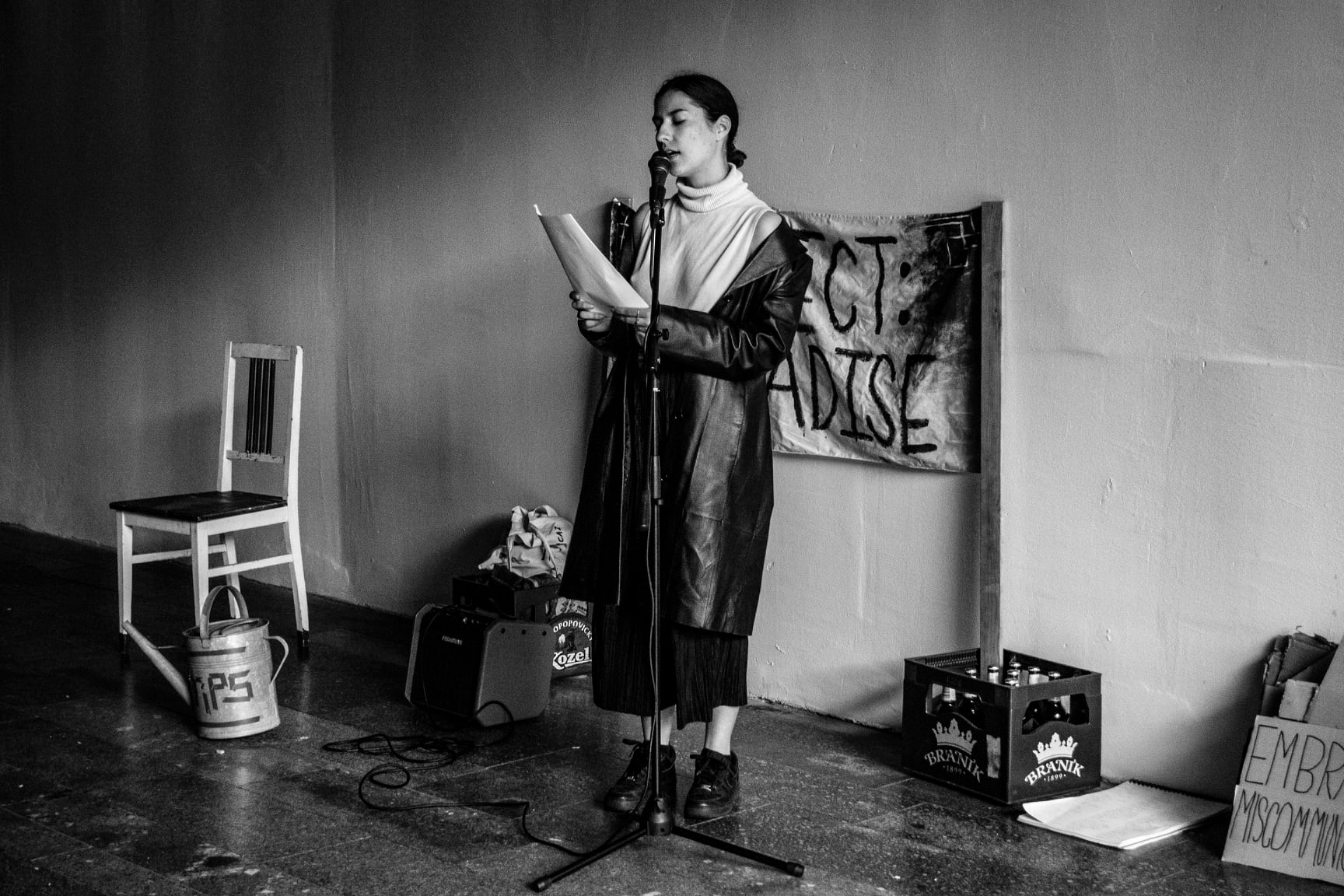

Nearly halfway through Yeva’s performance, Sasha Rose began bargaining from transparent coat pockets with audience members, selling from her jacket various items, for example, a condom and a folded up 1970’s porno picture & a roll of receipt paper (for spontaneous transactions), raw materials (a piece of metal and a piece of wood), and non-raw materials (6 small handmade painted prints and a picture frame). Sasha’s street sales would last the duration of the event and long into the night that followed.
*If you are interested in hiring a professional trenchcoat saleswoman to make an appearance at your next party or event, you can contact Sasha here.
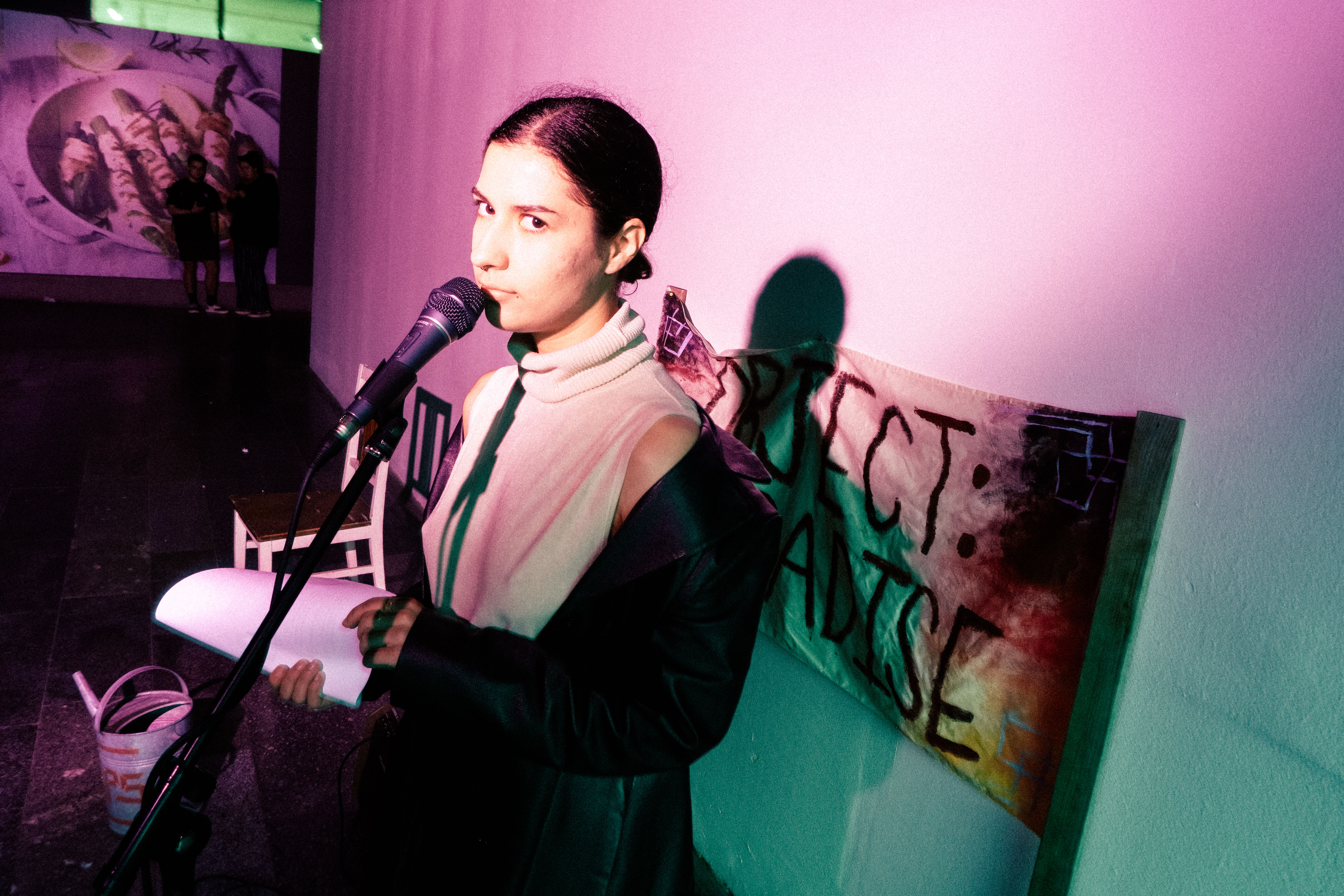
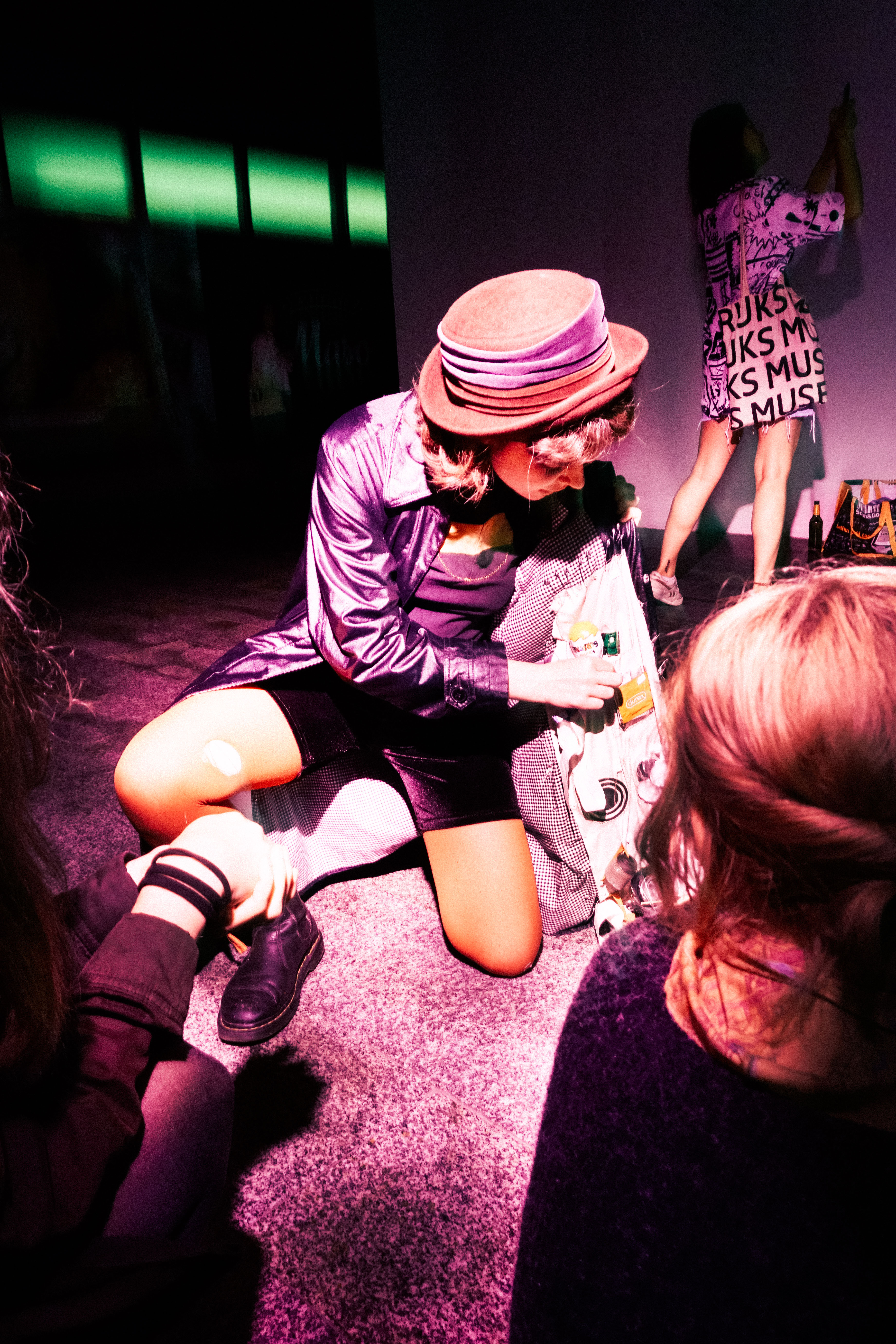
Audience members soon found themselves wondering who was part of the performance and who accidentally came here. A slow murmur filled with laughs, gasps, stand-up bass, clarinet, and rain trickle. What would happen next? Why is that woman carrying a table with a dying monstera atop?

Honza Dibitanzl entered the conversation by listening to audience members, circling the space in red eyeliner asking for words to spark a conversation. The quartet, directed by Roksan Mandel, comes in smooth with a steady beat that Honza glides his feet to.
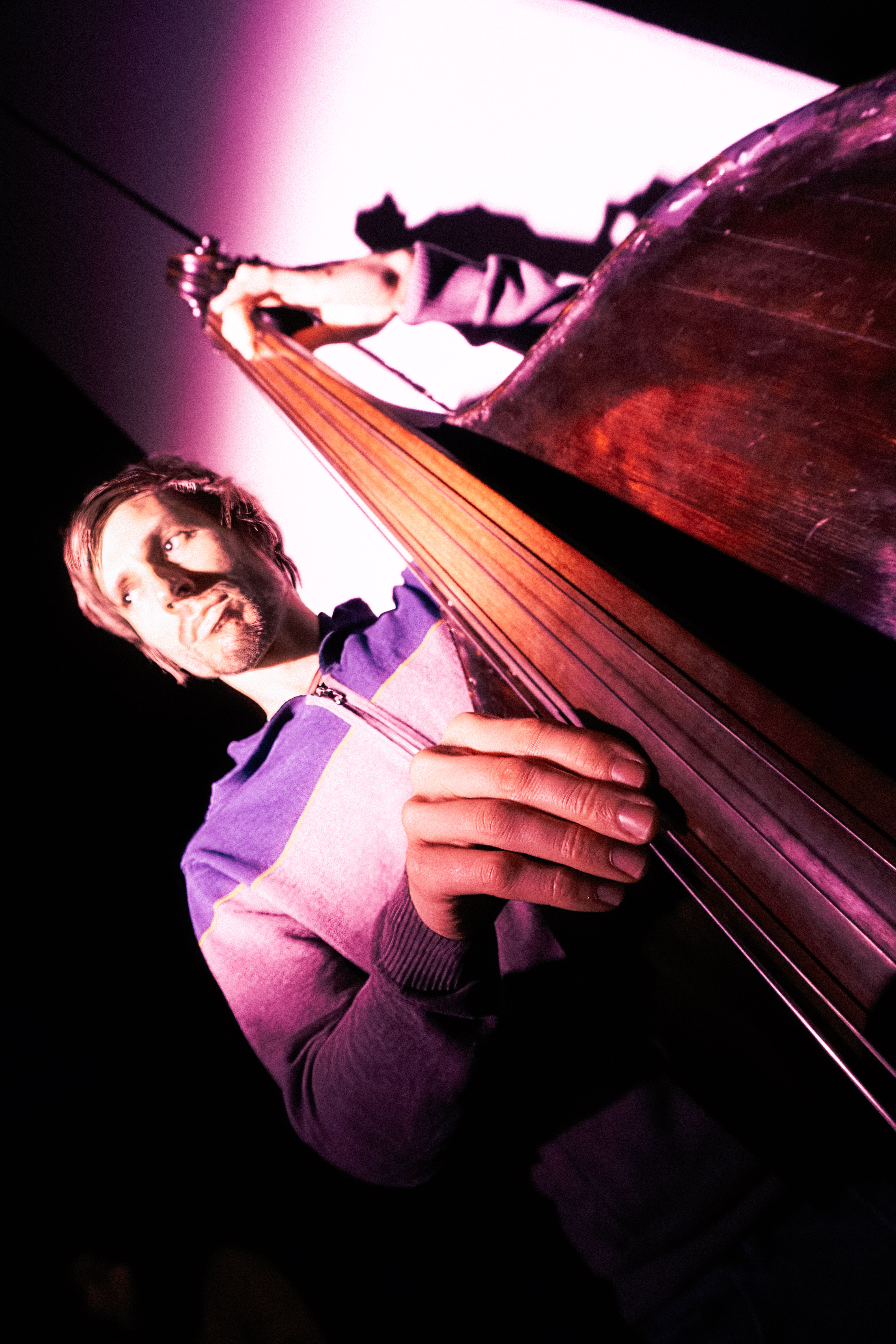

He bends down, he stands close, he looks a man in the eyes for too long, and then drinks his beer. Suddenly a dog barks, and he barks back. The crowd laughs and Lenka begins stacking furniture like ill-fitted legos. The two circle the installation and lock eyes under a chair, their bodies stretched in the center of the space.

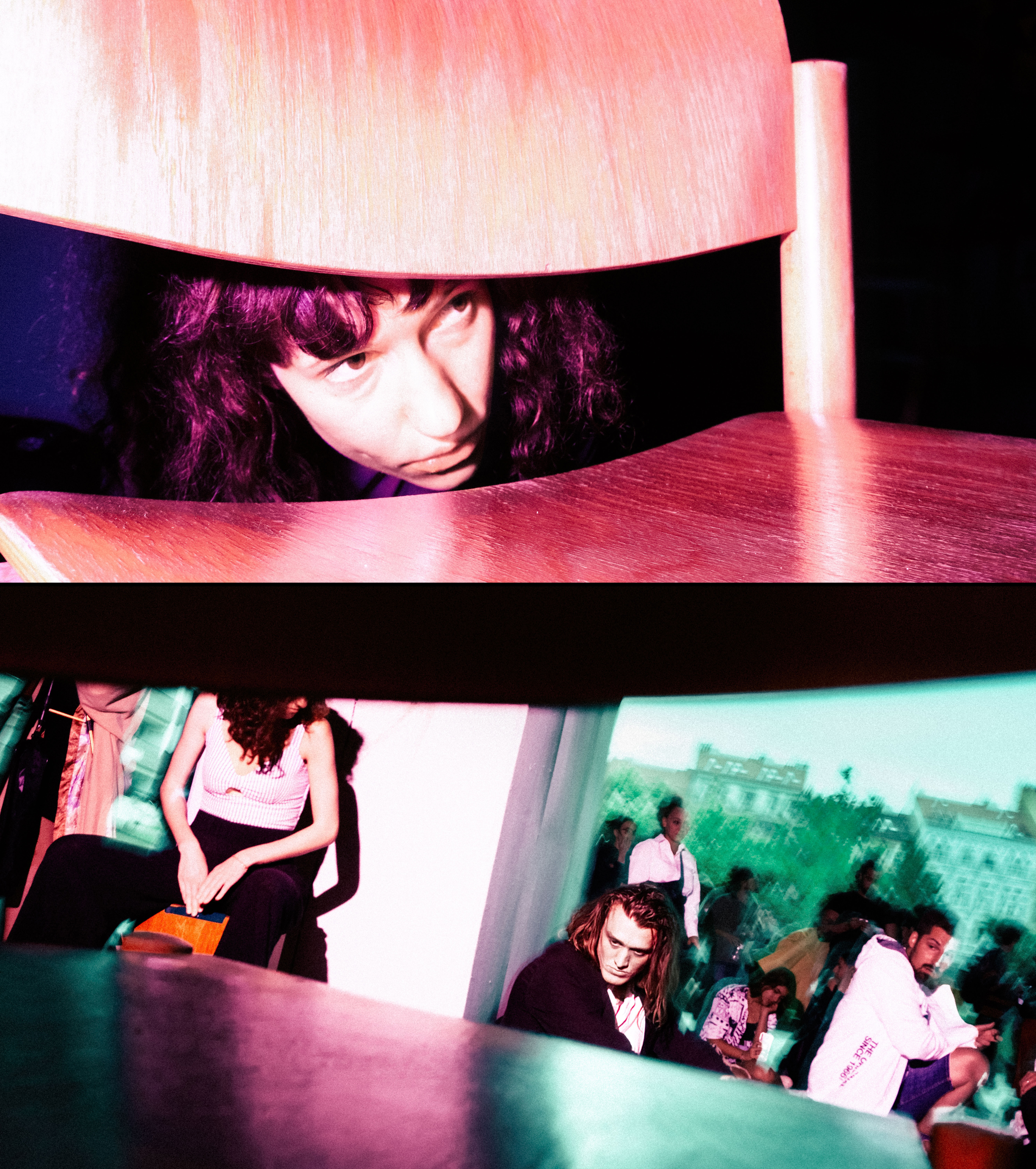
Thor Garcia postures himself before the microphone, sporting camouflage gloves, a fedora, and protective safety glasses. It’s raining and he’s wearing board shorts. He begins his act by repeating that the audience is a fence sitter, “raise your hand if you’re a fence sitter—you’re all fence sitters I know it!” and continued propagating the politics of the individual and the community while the crowd swayed before the asparagus.

Appearing from the crowd, a fight emerges between two men with similar haircuts, dark and curly. Saksham Sharda and Sylvain Benzakein. They begin shoving each other in the middle of the space before the audience and Thor. The orchestra persists in sound and image, in energy and static.
“Looks like we have a couple of fence sitters here! Who else is a fence sitter?” Thor responds.
The couple slows down for a minute, glances towards the crowd, and begins kissing with tongue in cheek.
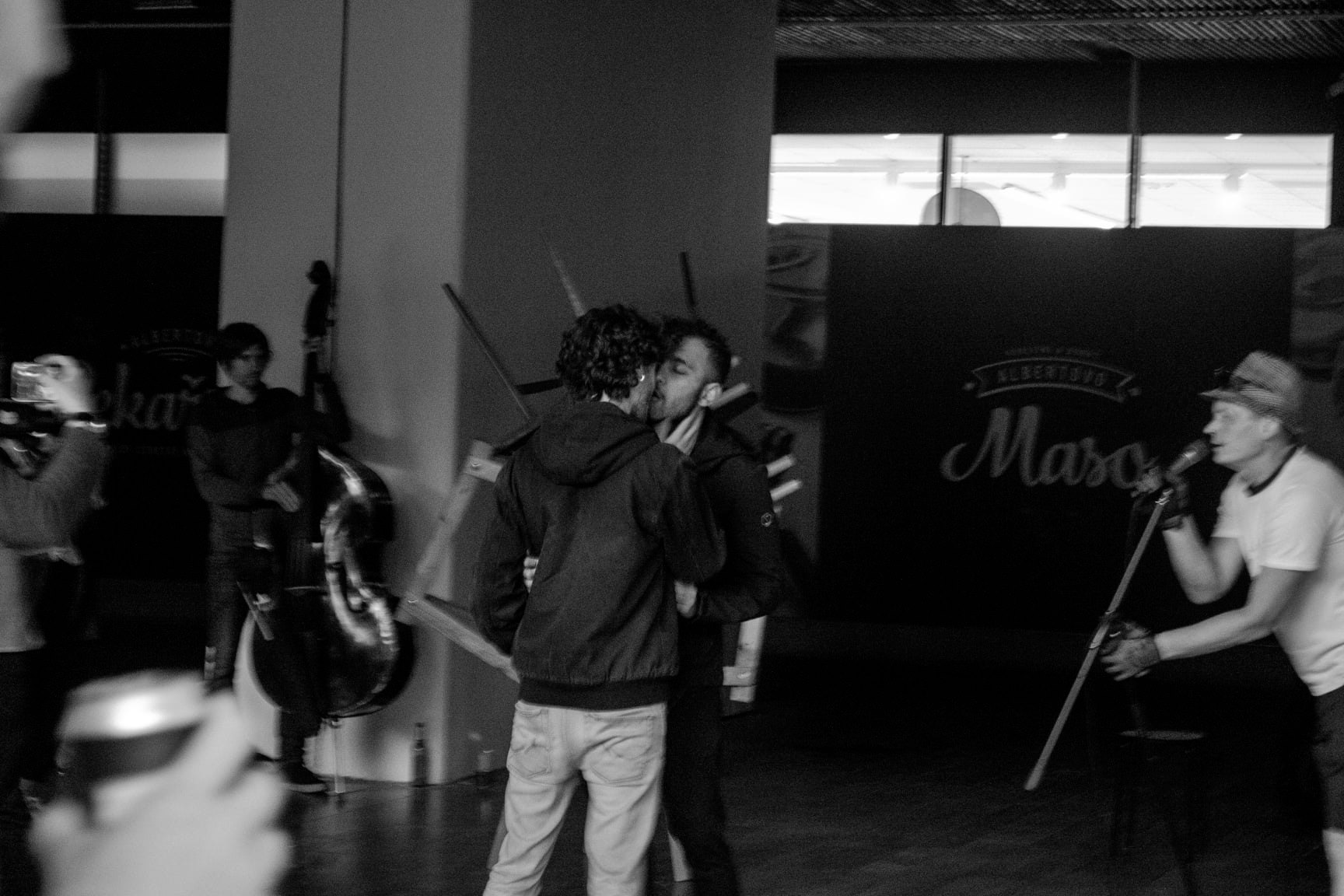
Everyone at the happening is talking, is bopping, is stopping to see what will happen next. Michael Rowland takes the mic and recounts his Žižkov devotion. He stands tall in front of the OBJECT:PARADISE banner and talks of sidewalks while standing still.

Halfway in, a suited man walks and blocks the view, the space between audience and performer. The space between producer and receiver. He’s talking loudly, abruptly, “did you cc me on that? Who’s the new intern? Who told you that?”
Aaron Barnnett, the suit walker, continues to circle the space for the next twenty minutes, entering in and out of the stage, the performance, and becomes part of the text itself, coexisting as audience and performer.
“So that guy in the suit yelling on the phone is really part of all of this?” The disruption becomes part of the rhythm.
Tyko Say sits cross-legged at a mustard yellow typewriter in the center of the venue which sits on Lenka’s found furniture. He listens and rewrites the stanzas to Michael’s piece as he hears them.
“Žižkov...Žižkov...Žižkov...“

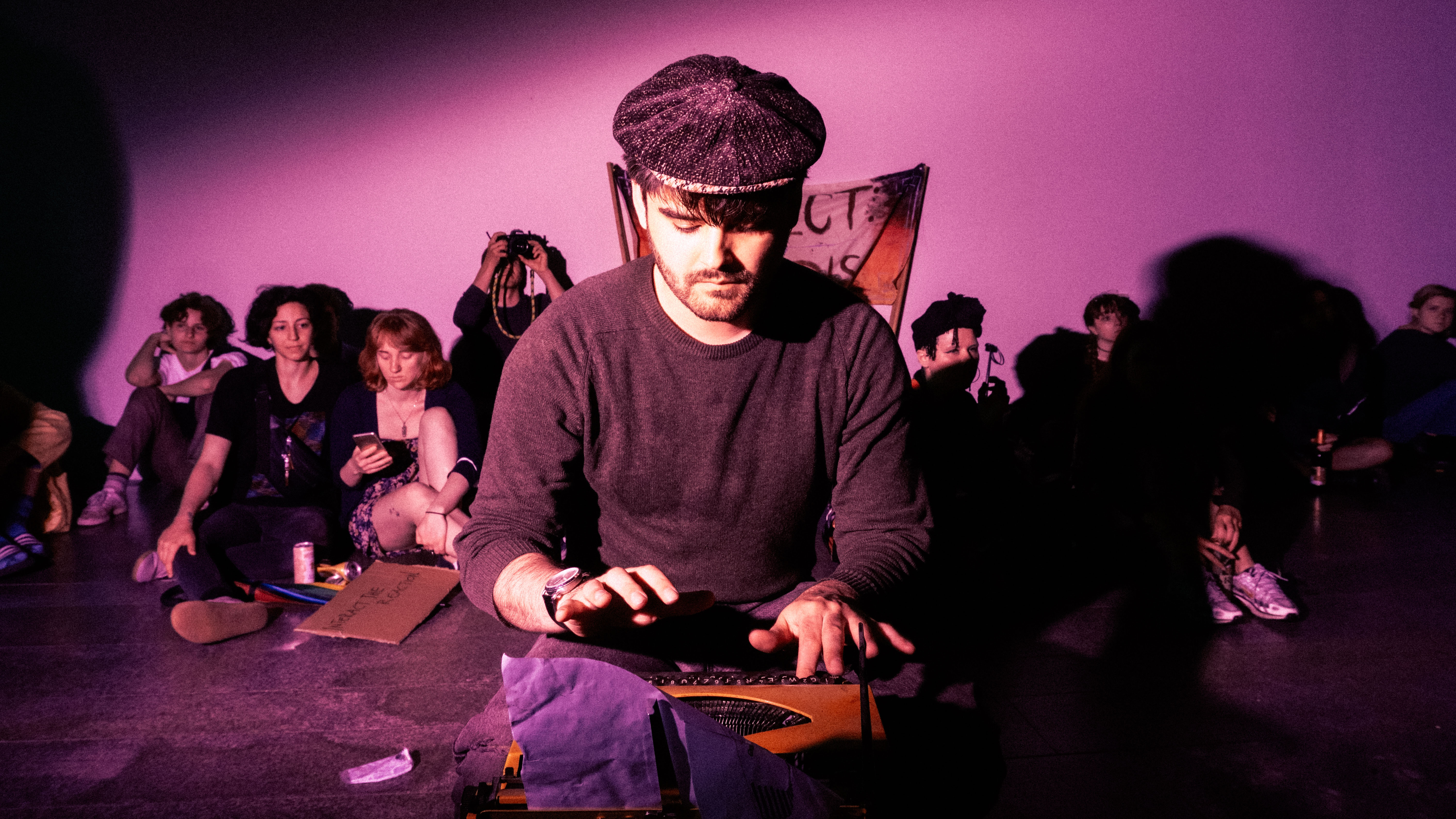
At stage left, Sára Drahoňovská begins sanitizing a table and needles in white latex gloves while Hunter Andrews sits with a pant leg rolled up above his knee.
Tyko Say stands behind the two and watch the heads of the audience suddenly start to turn all in one direction. Two policemen in bulletproof vests and FFP2 masks enter the stage, just behind Sára and Hunter.
Hunter begins his piece, “Oh Žizkov! Your streets are filling up with girls in flower dresses again!” The chaos ensues.
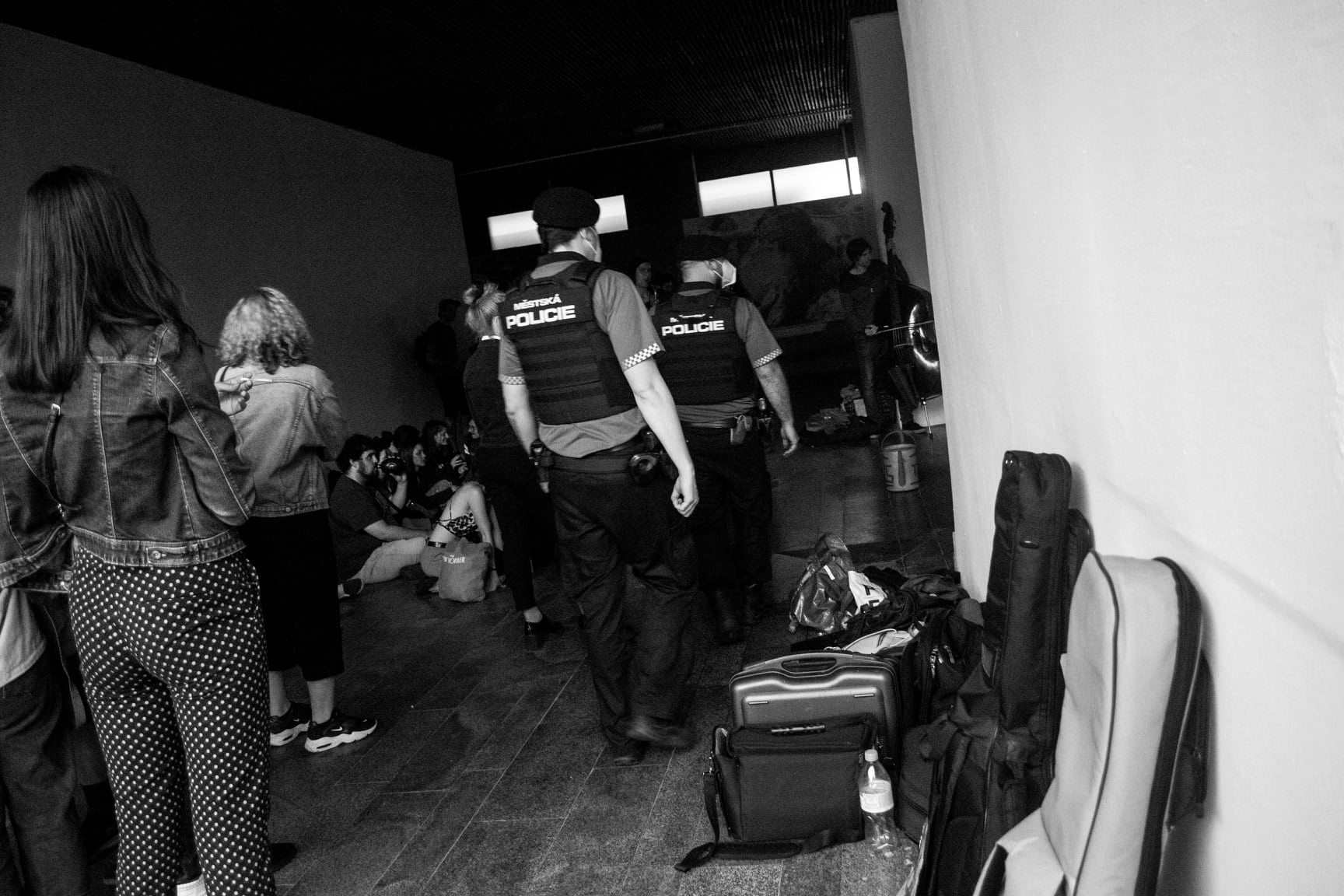
The audience watches intently, hands on cheeks, elbows on knees as the police scan the space for someone in charge. We’re all in charge. Roksan motions to the quartet to keep playing, to keep strumming, to keep blowing, to keep in charge, to keep the beat, to be the beat that the ship slowly sinks to.
“Is this part of the performance? Was that fight staged? Where’s the guy on the phone? Why are they still reading? Playing? Drinking?”
Jaromír Lelek approaches the two officers and greets them in Žižkov Česky. They reply, “someone called. Show us your papers, your permits, your credentials”.
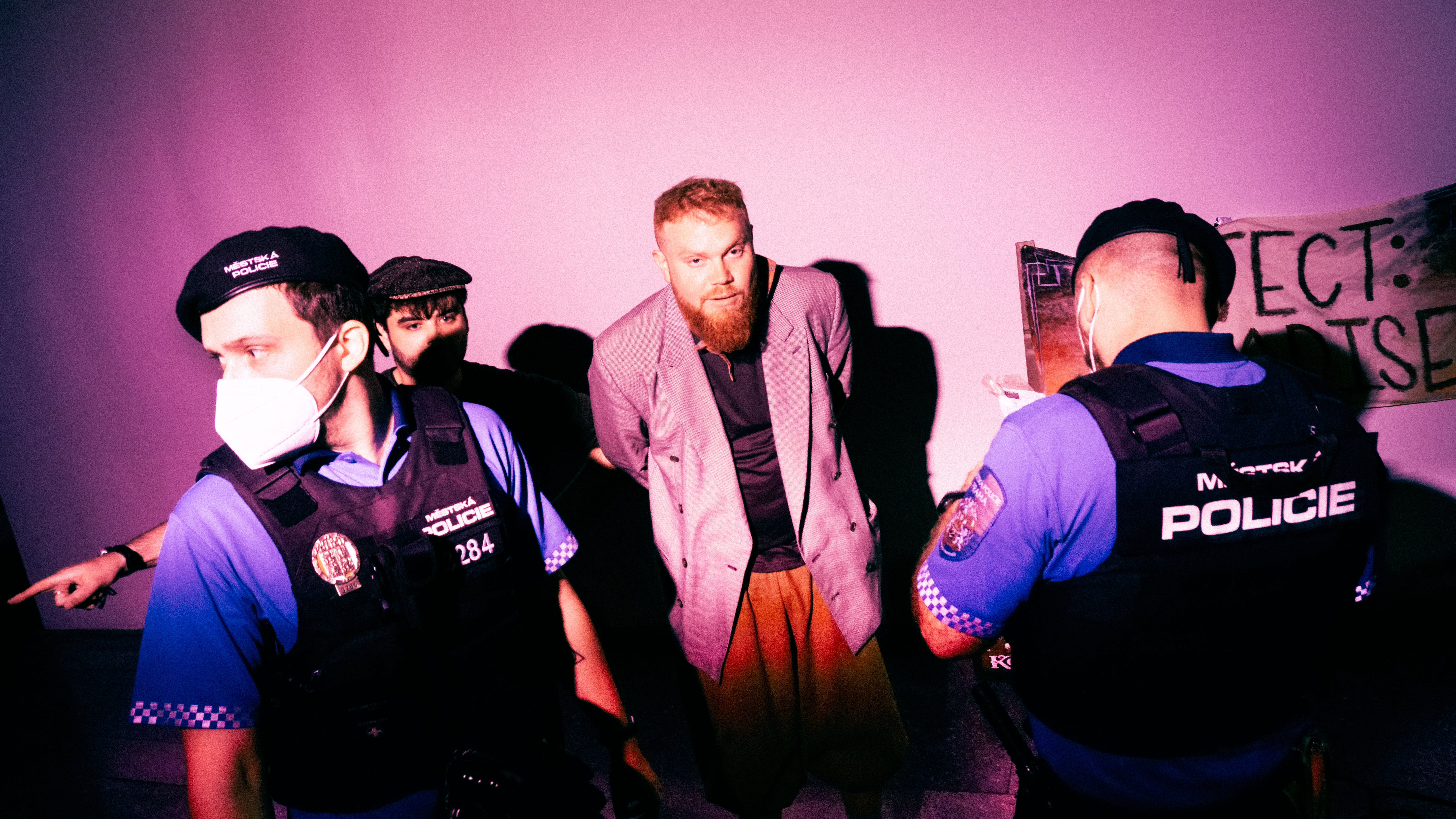
Hunter projects his stanzas into the crowd as Sára jabs a needle in his thigh and begins to craft a giant “Ž” for Žižkov.
“Your hospodas are filling up again! Žižkov!”
Tyko and Jaromír entertain the police with filed notices, explanations, smiles, and raised eyebrows.
“We don’t have anything, we filed a public notice for the stair set. Not the grocery store.”
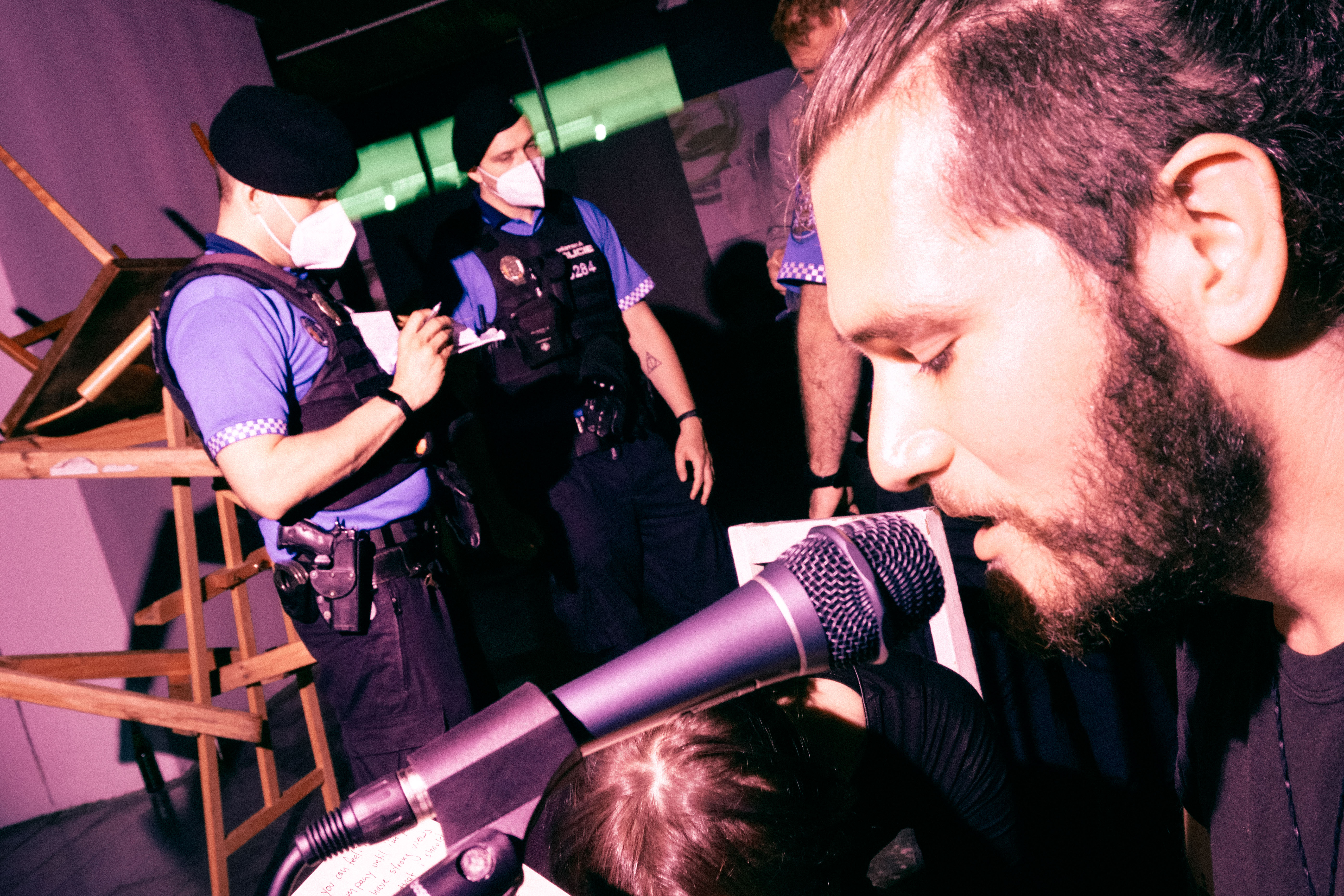

“But please explain what’s happening here—what is this?” the police persist.
The audience comes in closer, enclosing the space between the two columns and crossing any boundary that is left between the audience and performer. Would the ship sink? Was the iceberg really that deep?
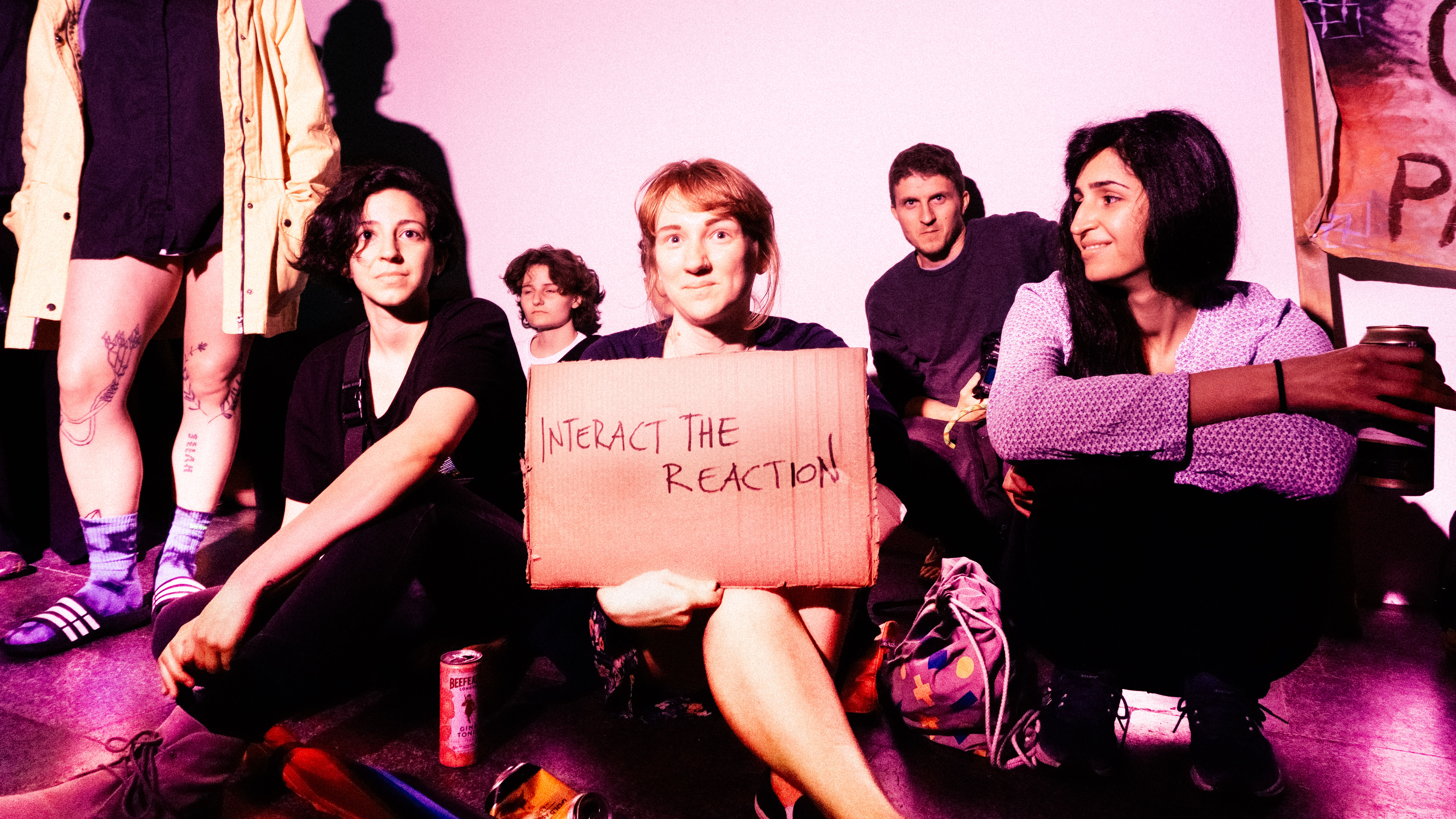
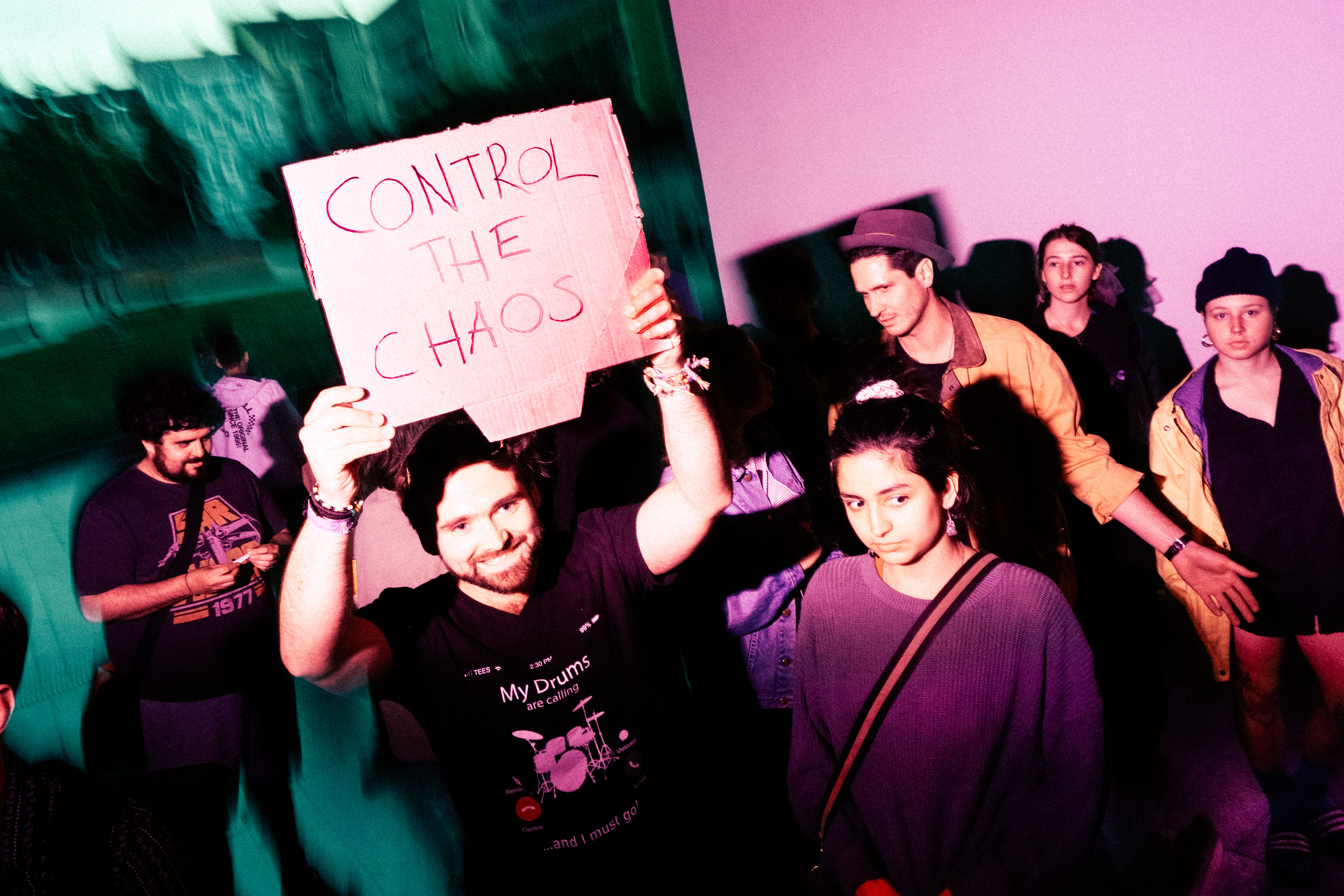
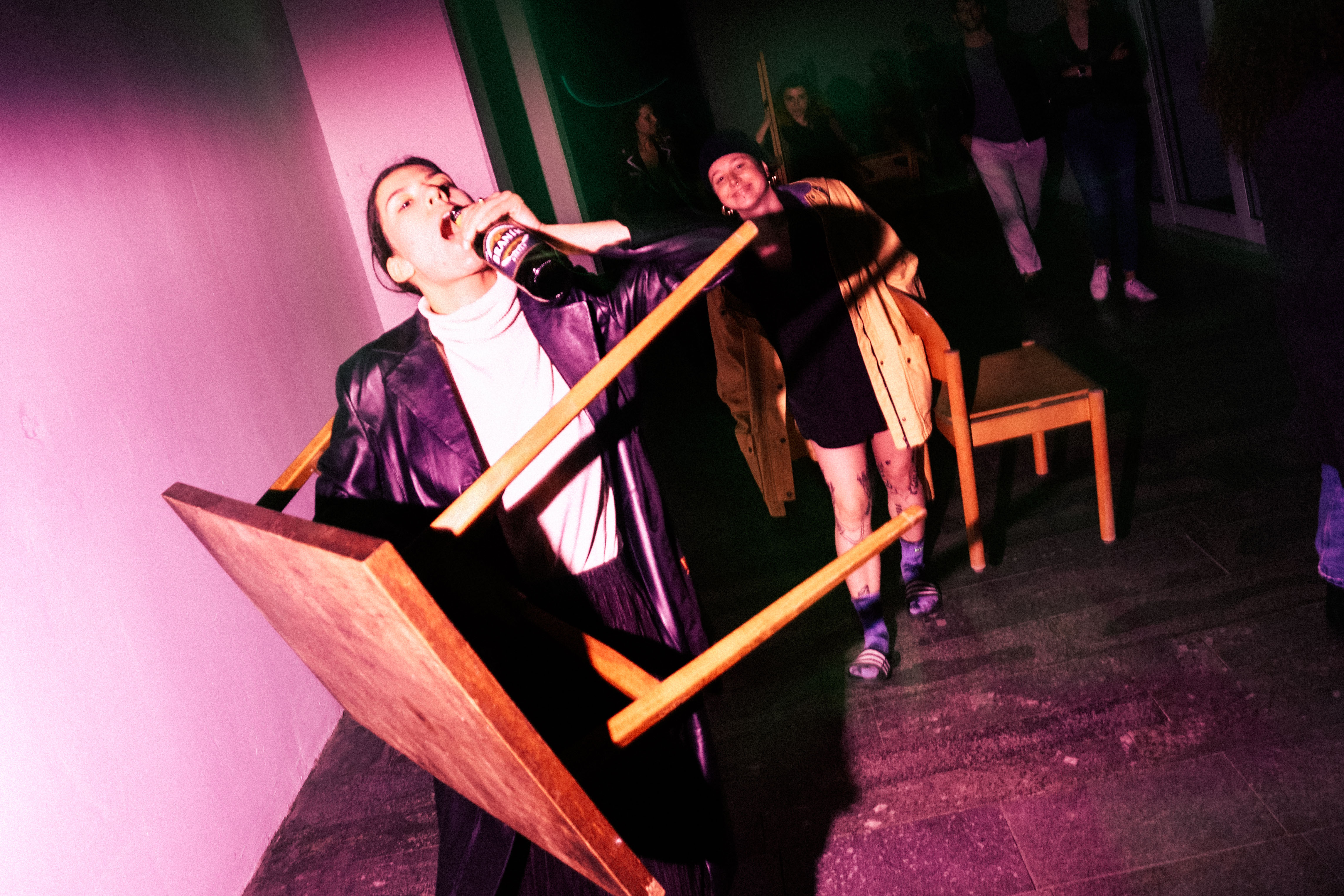


Three more officers arrive—one with a blue shirt with checkered reflective squares on it.
“What’s going on here?”
“They’re having a poetry reading” one of the officers replied, seemingly shy to admit that they have to shut the happening down.
Collective members, Jaromír Lelek, Roksan Mandel, Tyko Say, and Sandra Pasławska deliberate on what to do next: back to the stairs? Shut it down? Anarchy? What about the third act?
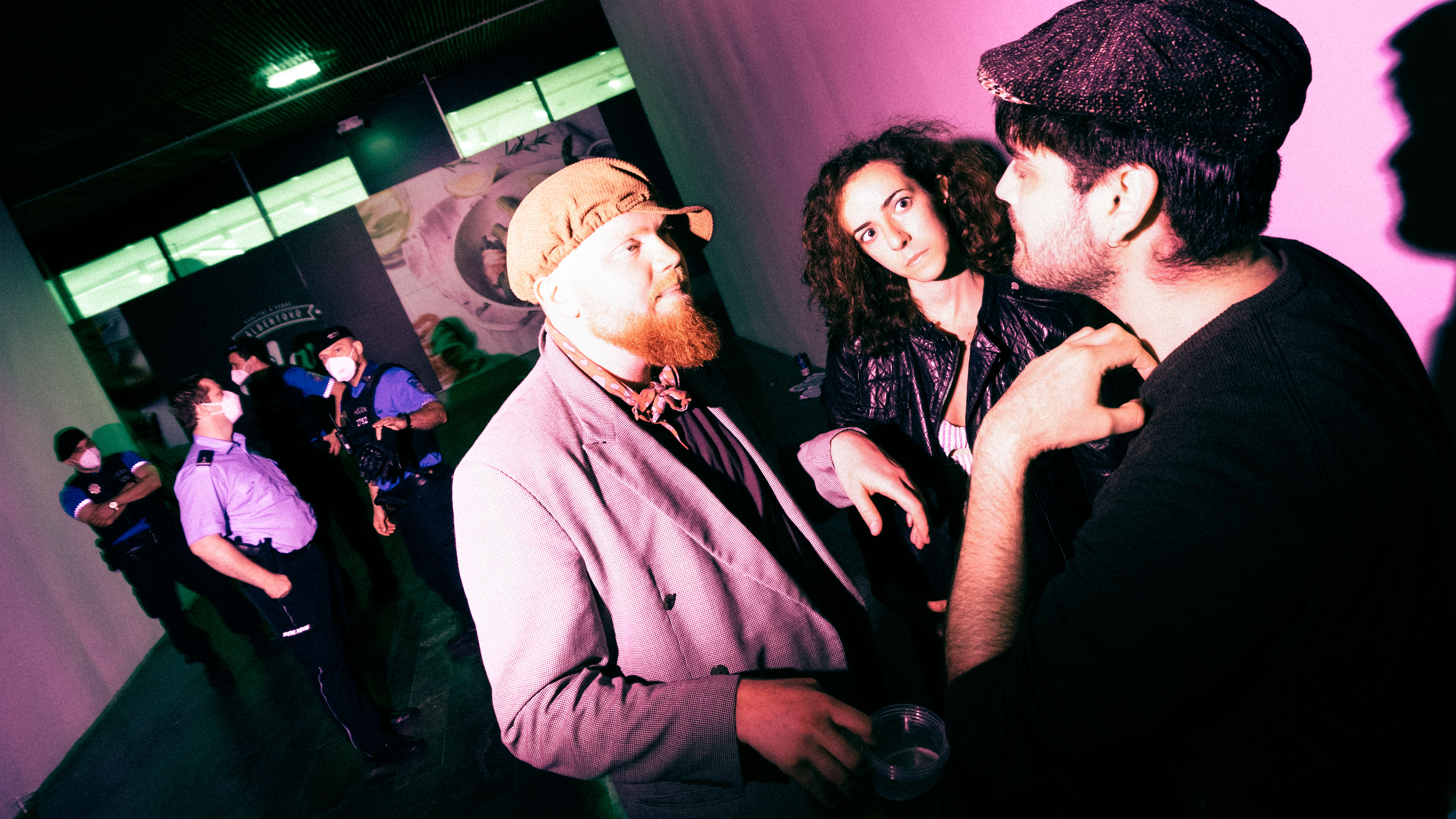
The show will go on. Tyko took the mic and elaborated the situation to the participants of the moment, “no more music or microphone, but keep your beer and see what happens next.”

Sandra Pasławska and Mary Palencar begin laying out the large white sheet in the grass adjacent to our once-urban stage.
Sandra starts off a new text in a singing ode with a direct call to action to the audience, participants, police, and herself: to become Žizkov.
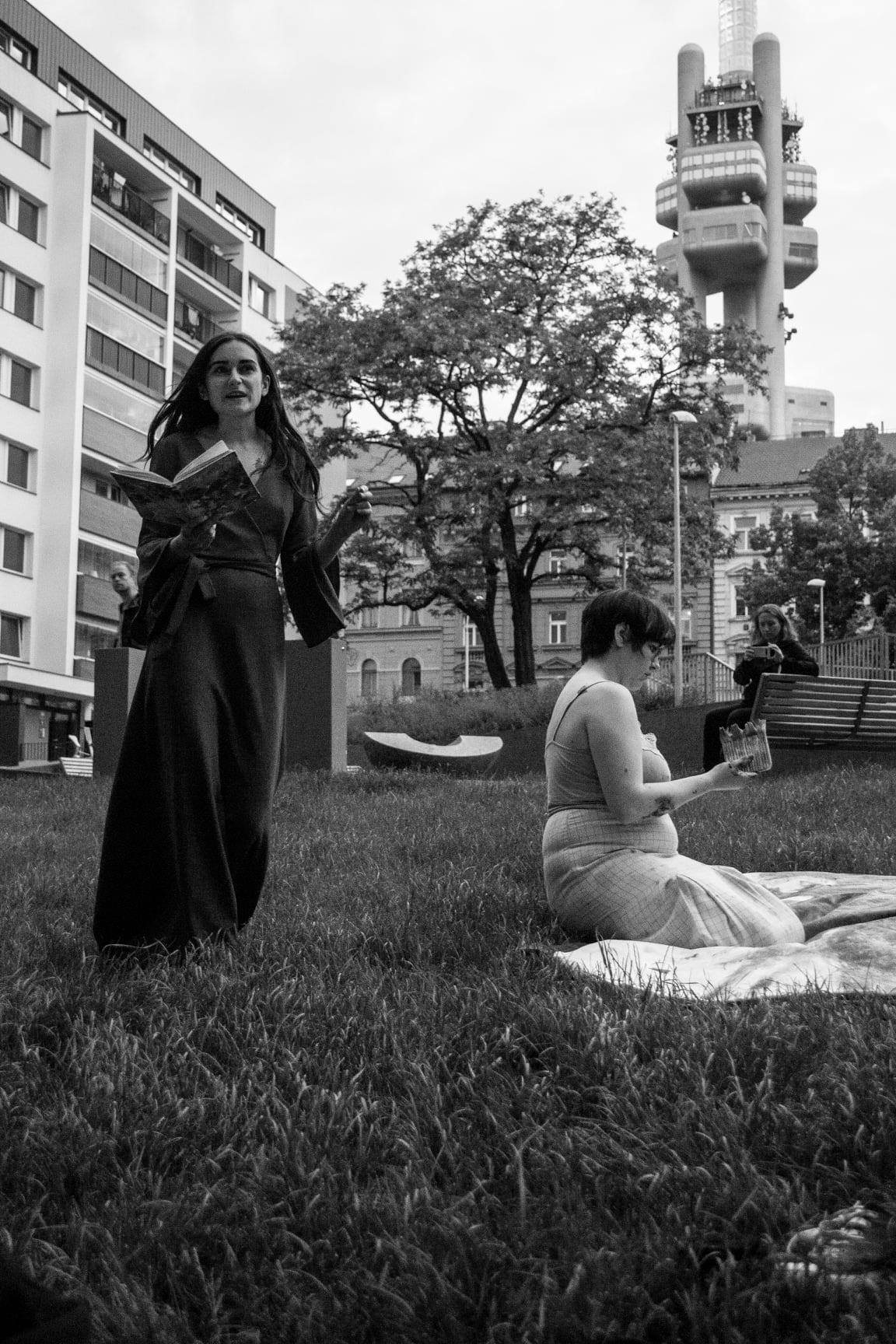
Sandra gets on her knees and Mary covers her head, face, and dress in paint and starts to use her as a brush against the bed sheet. The police watch on intently, making sure to keep Jaromír in proximity.


After some silence, participants of the moment begin to come forward towards mary’s brush, allowing their bodies to become painted in a shared coat of Žižkov. Mary holds the hands of those who dare to come up and, she greets them with a shared giggle.
Everyone knew what it was all about, and for that moment it felt like real communication was happening.
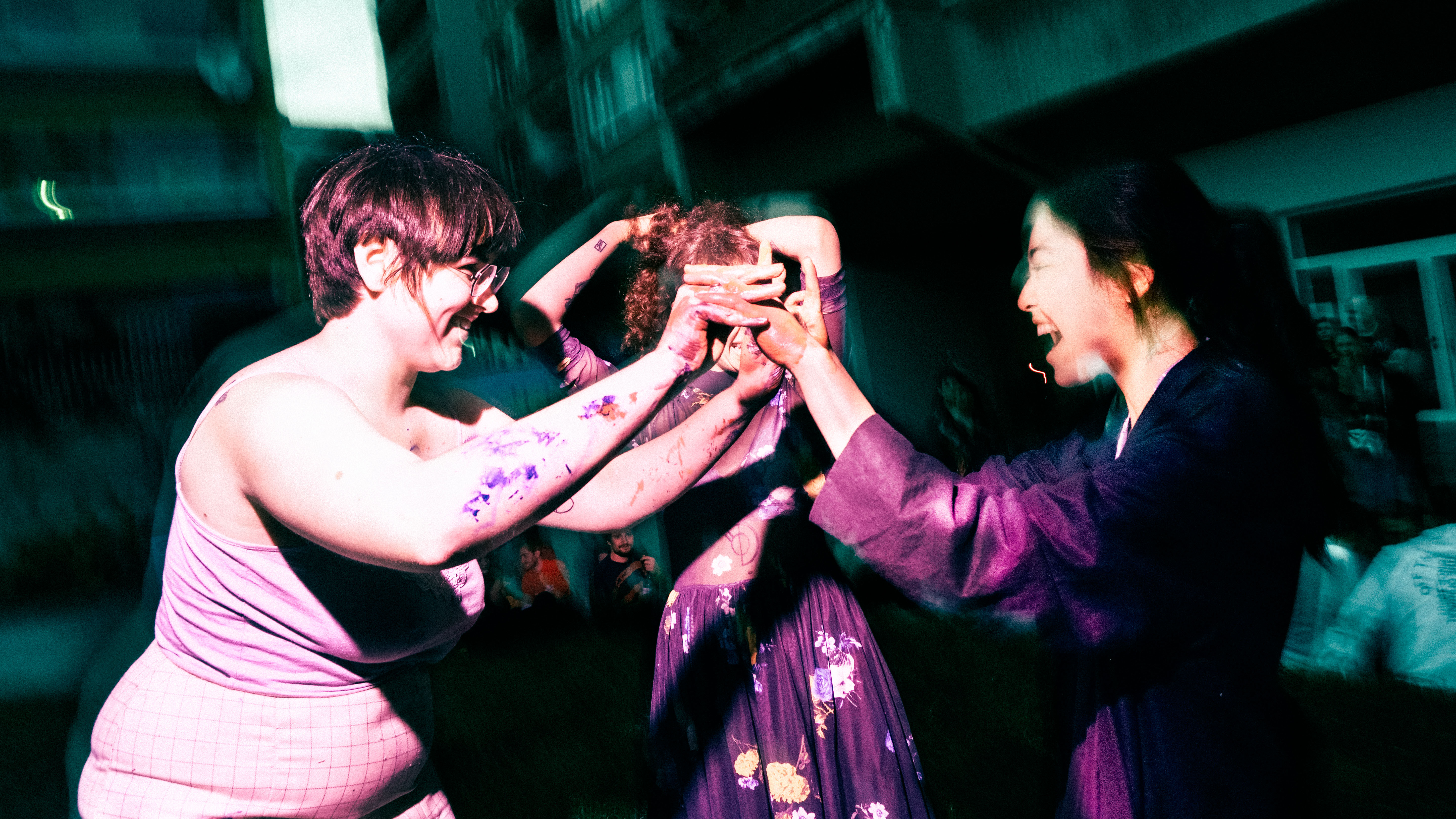
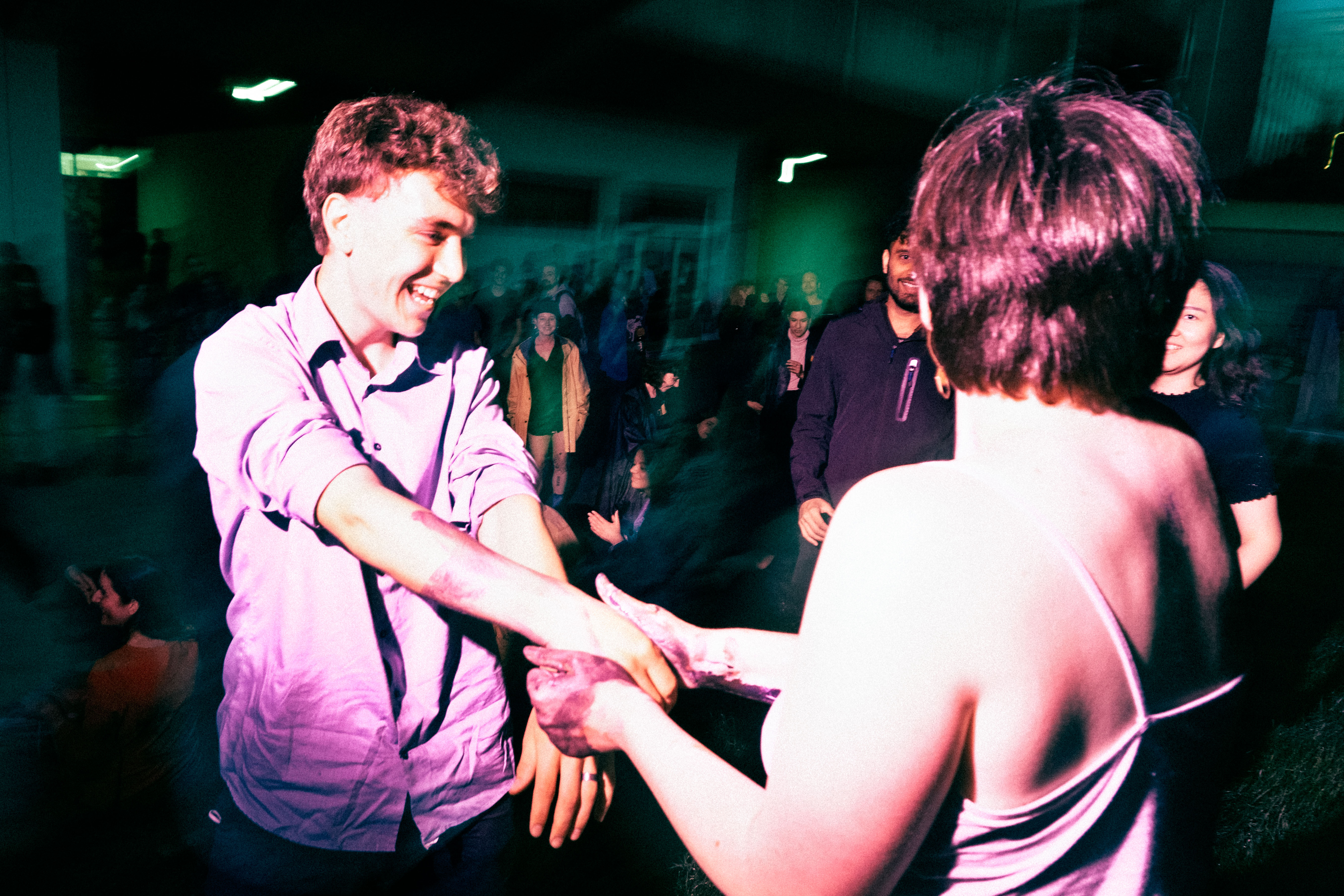



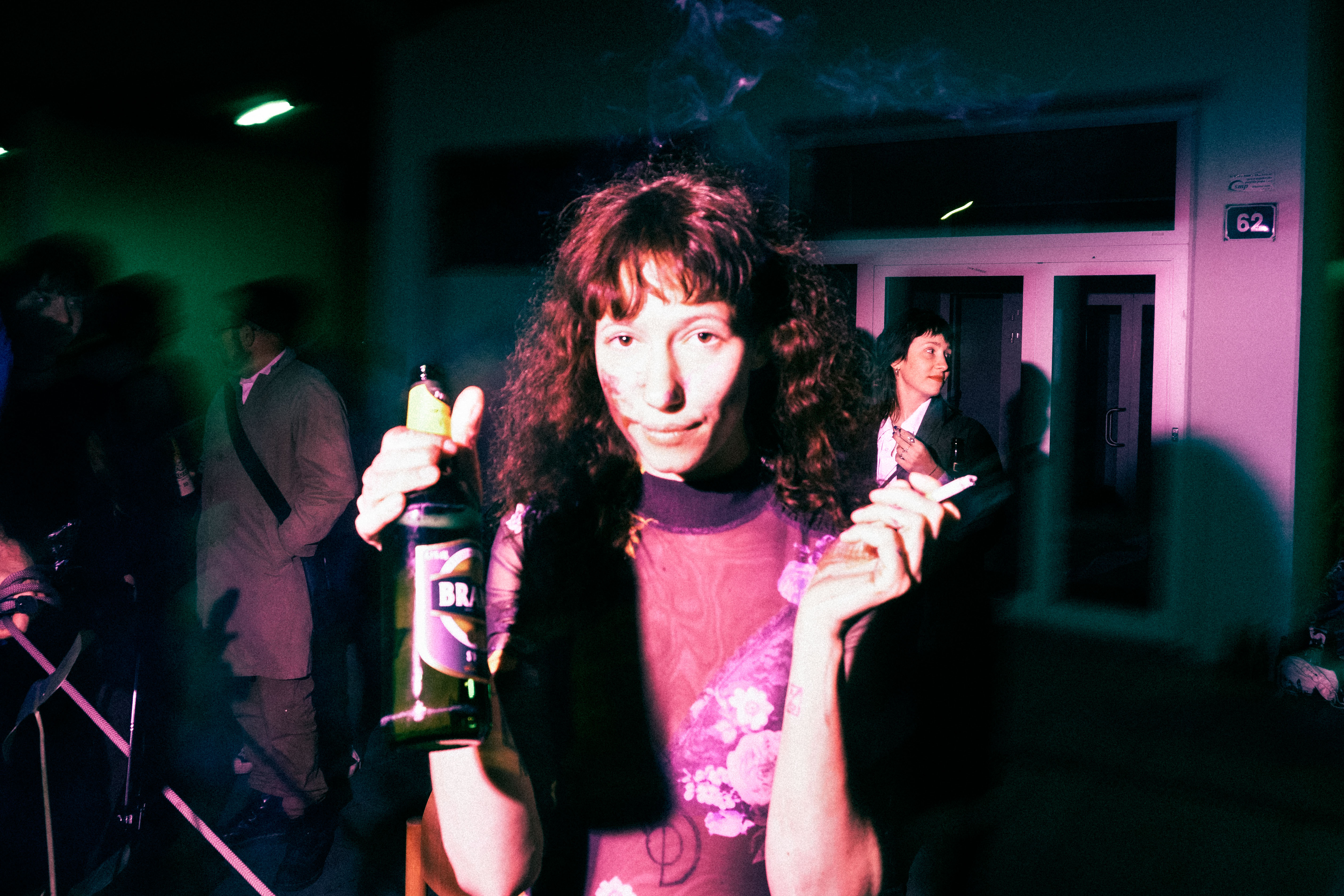


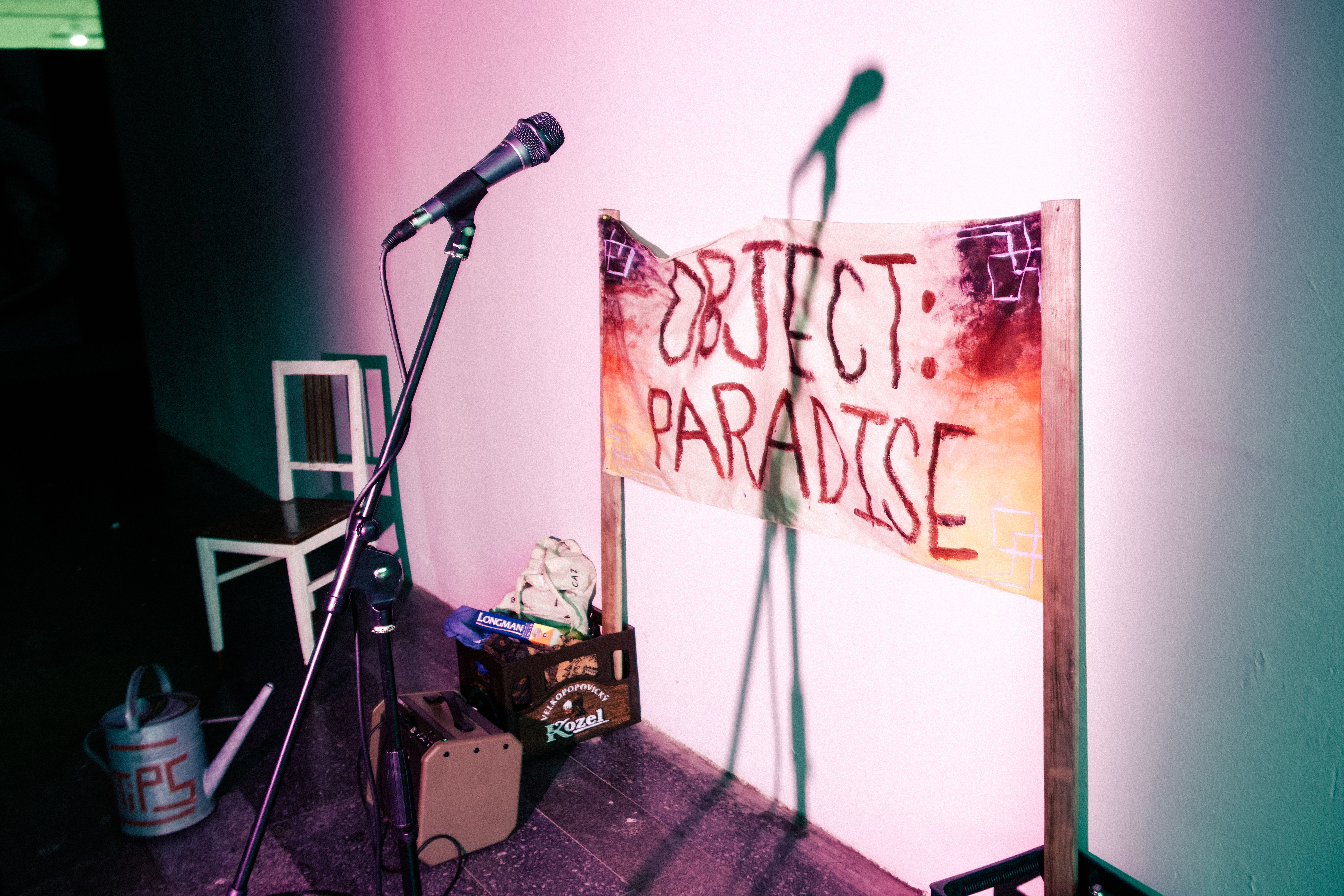

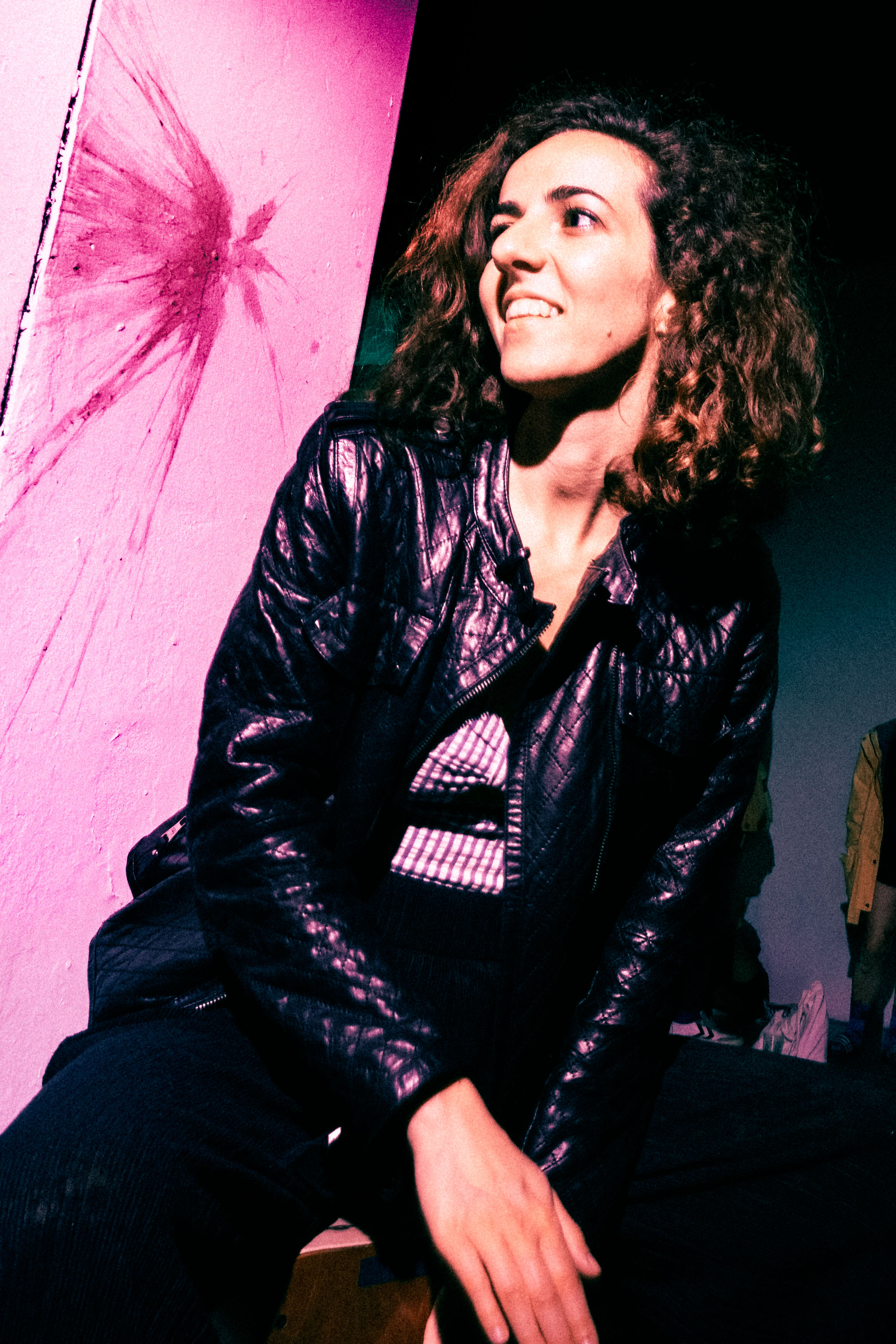
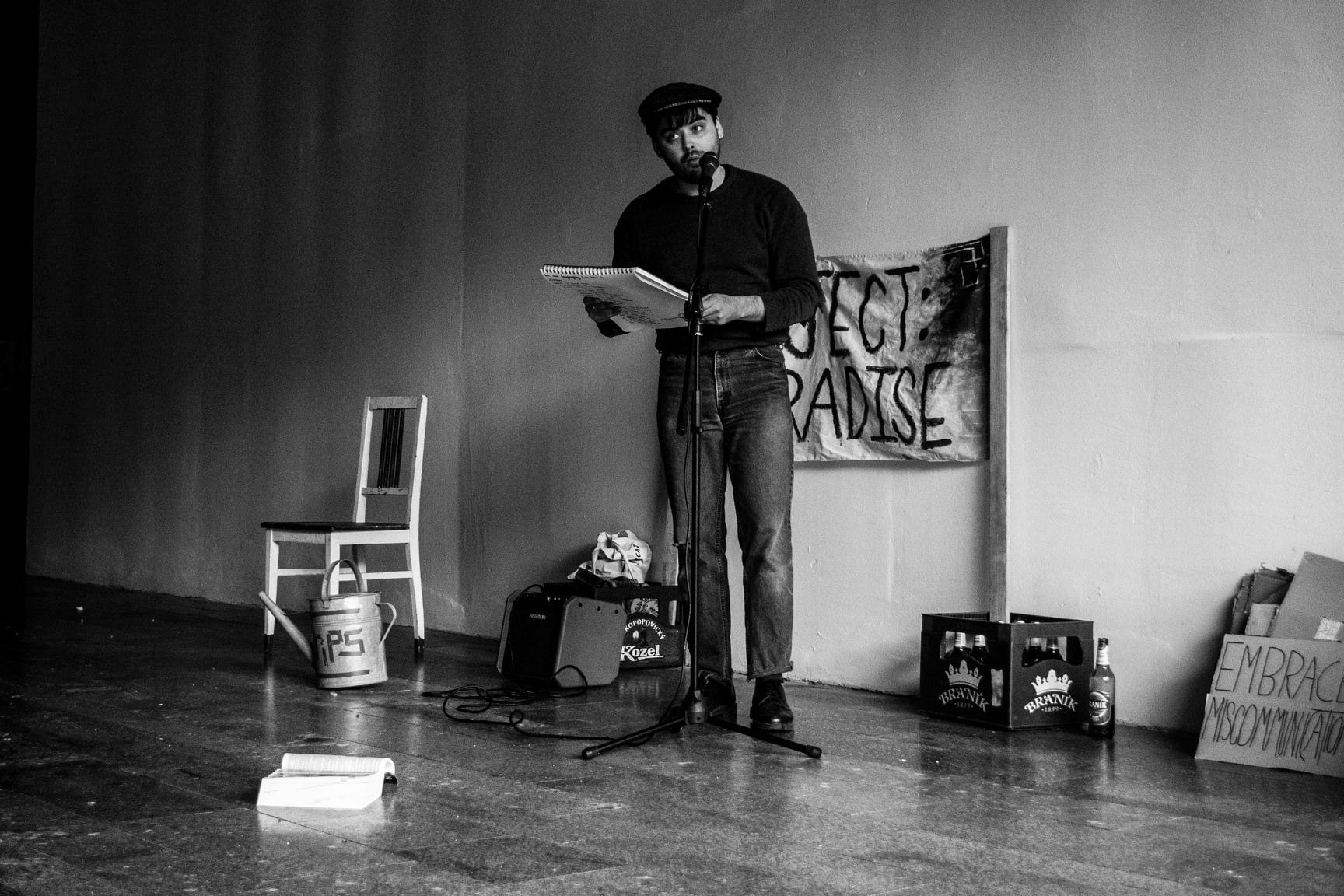

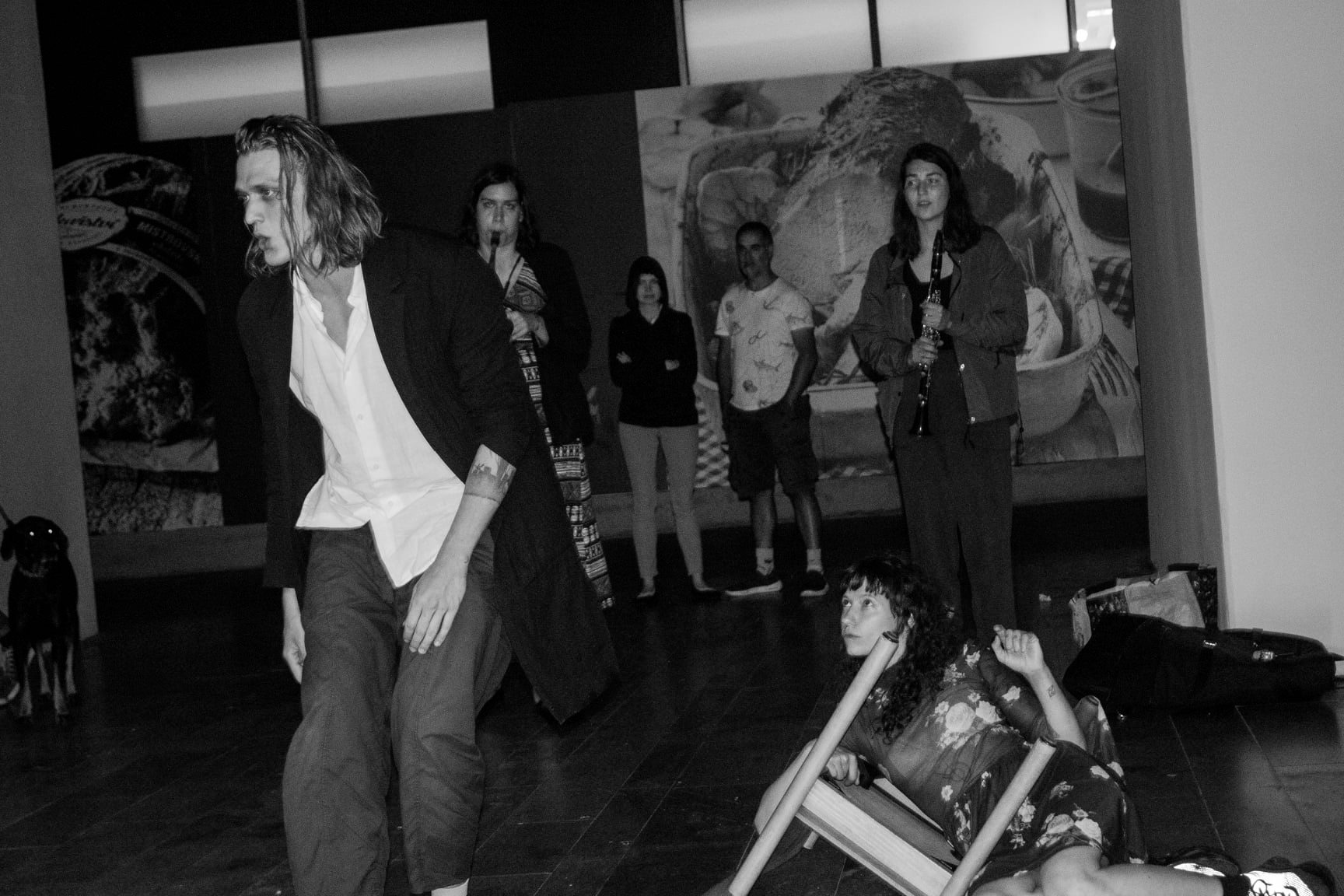






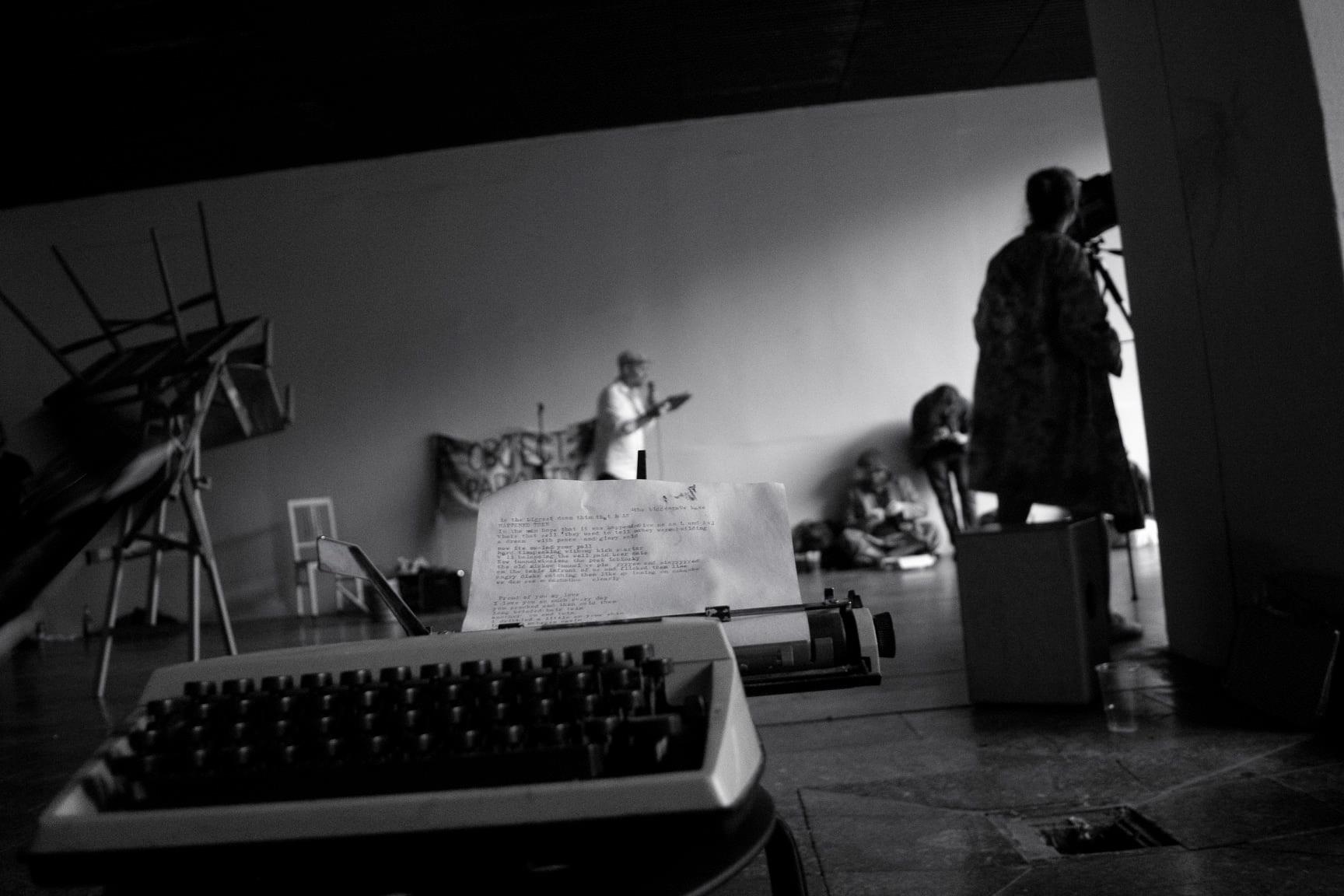
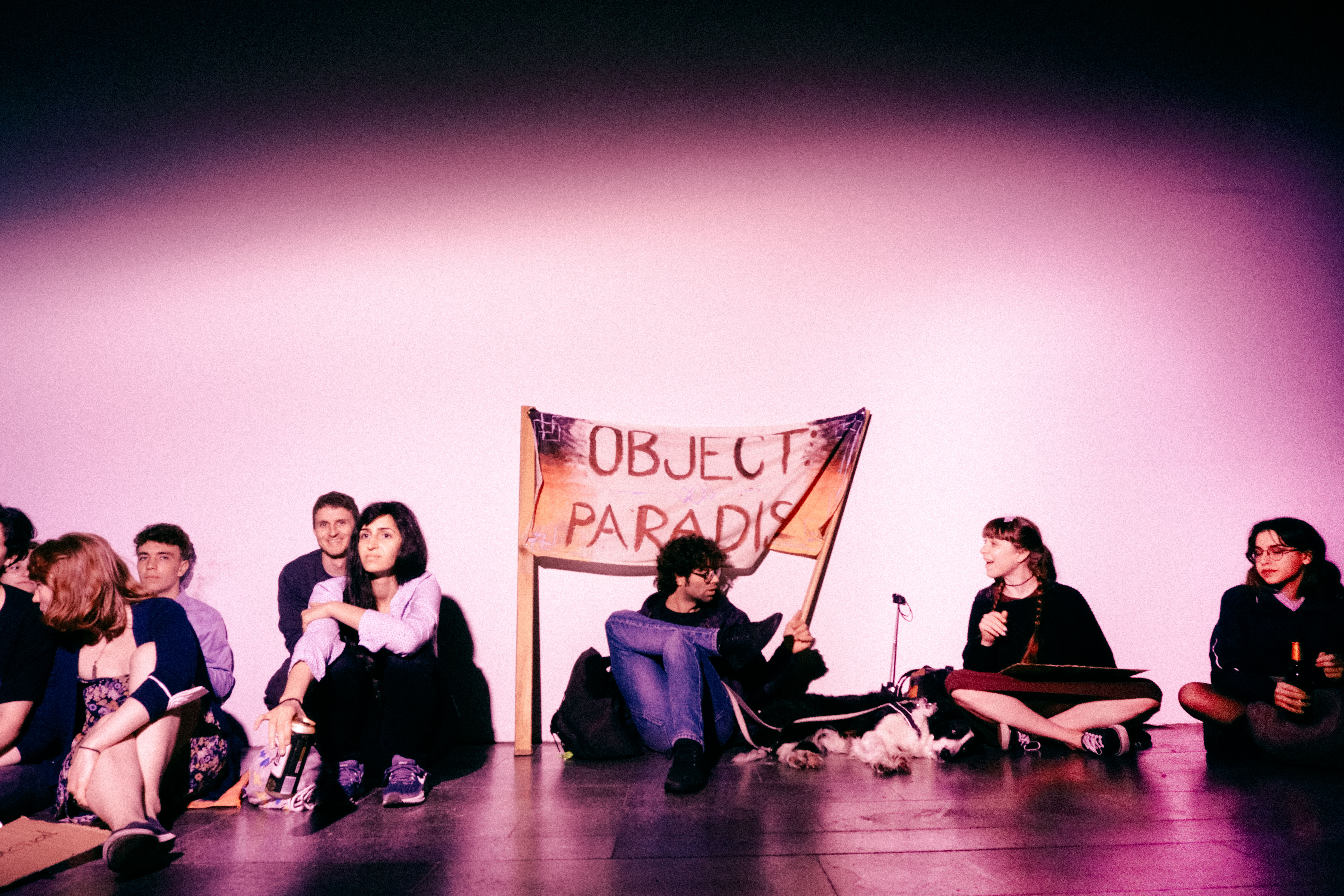


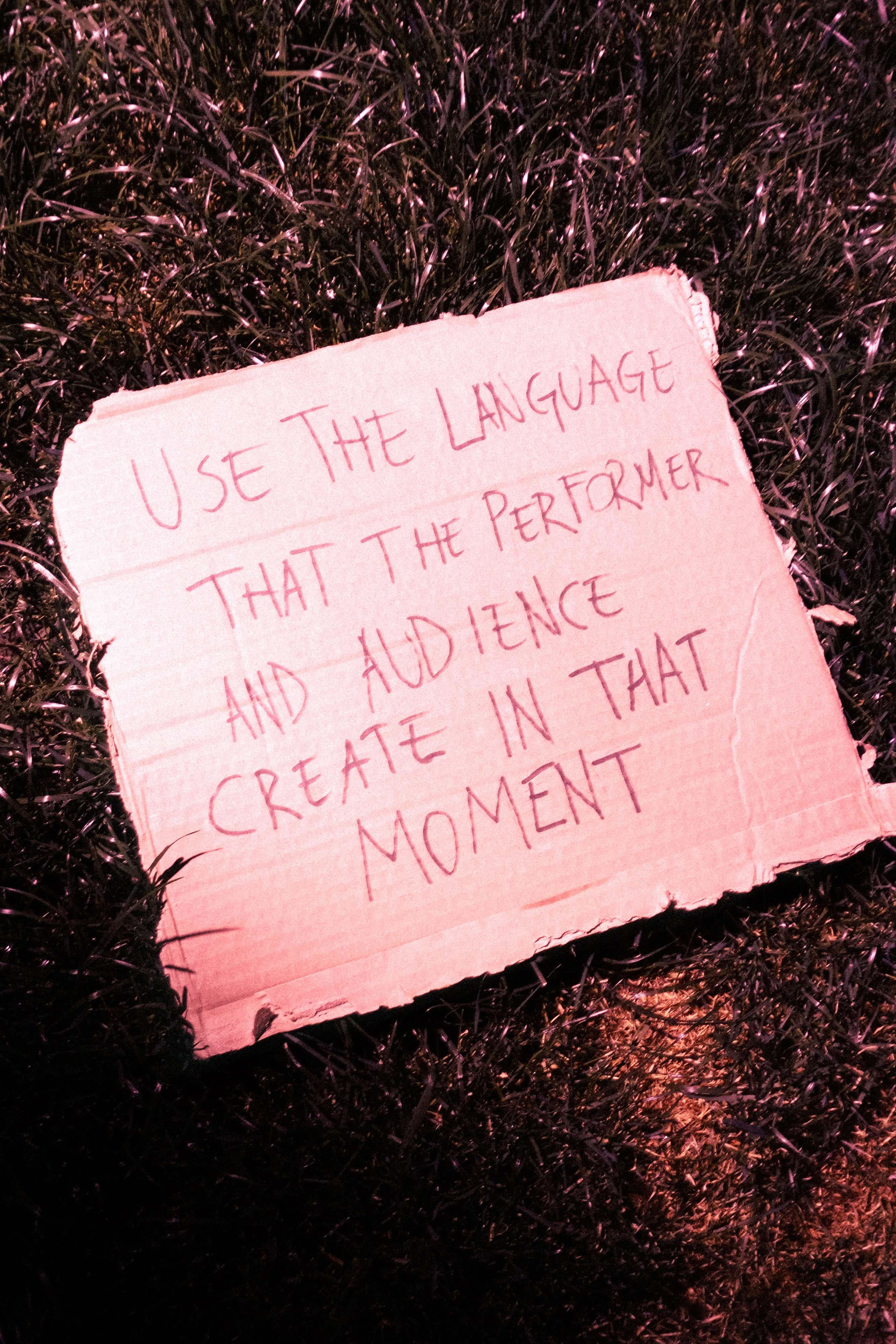
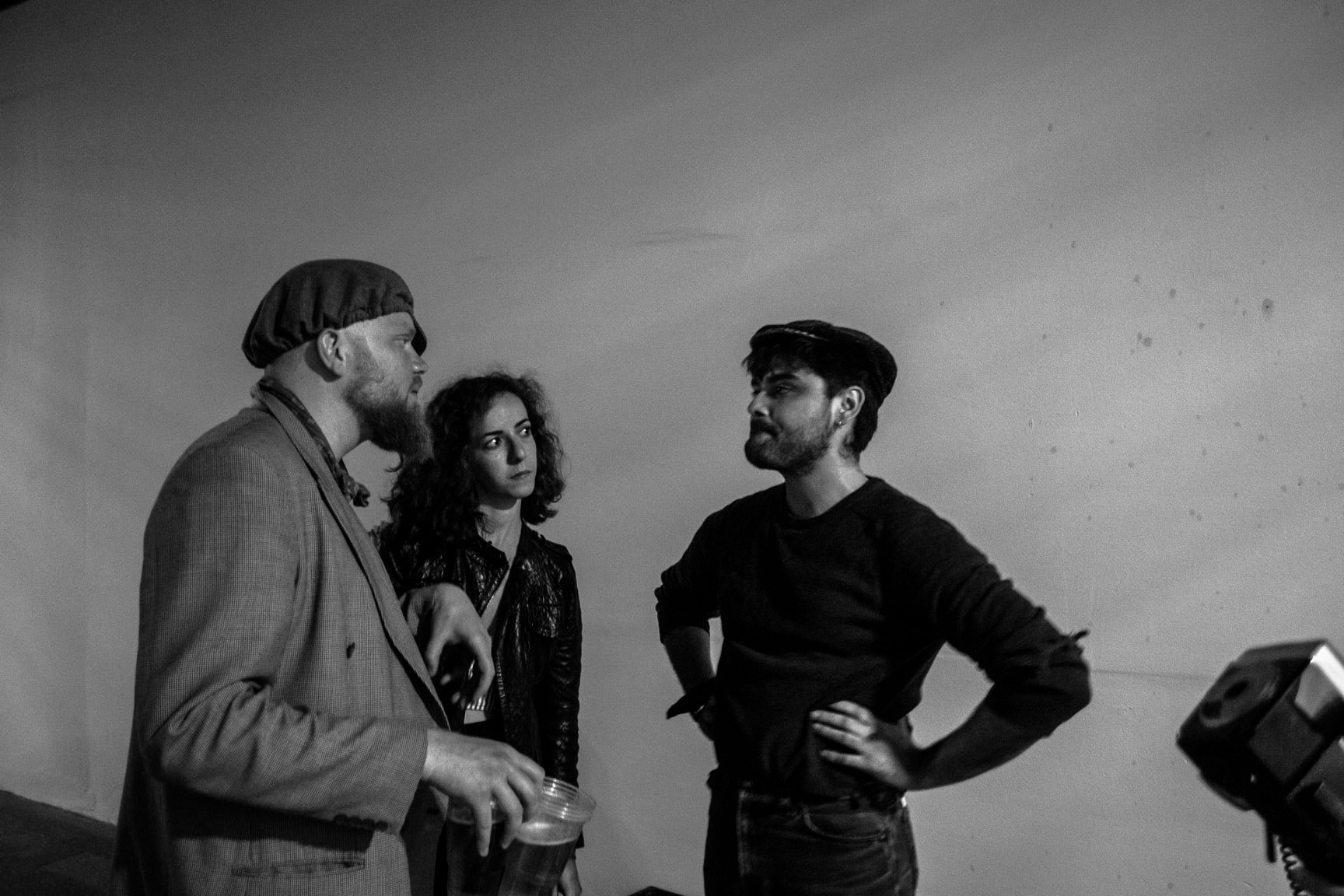
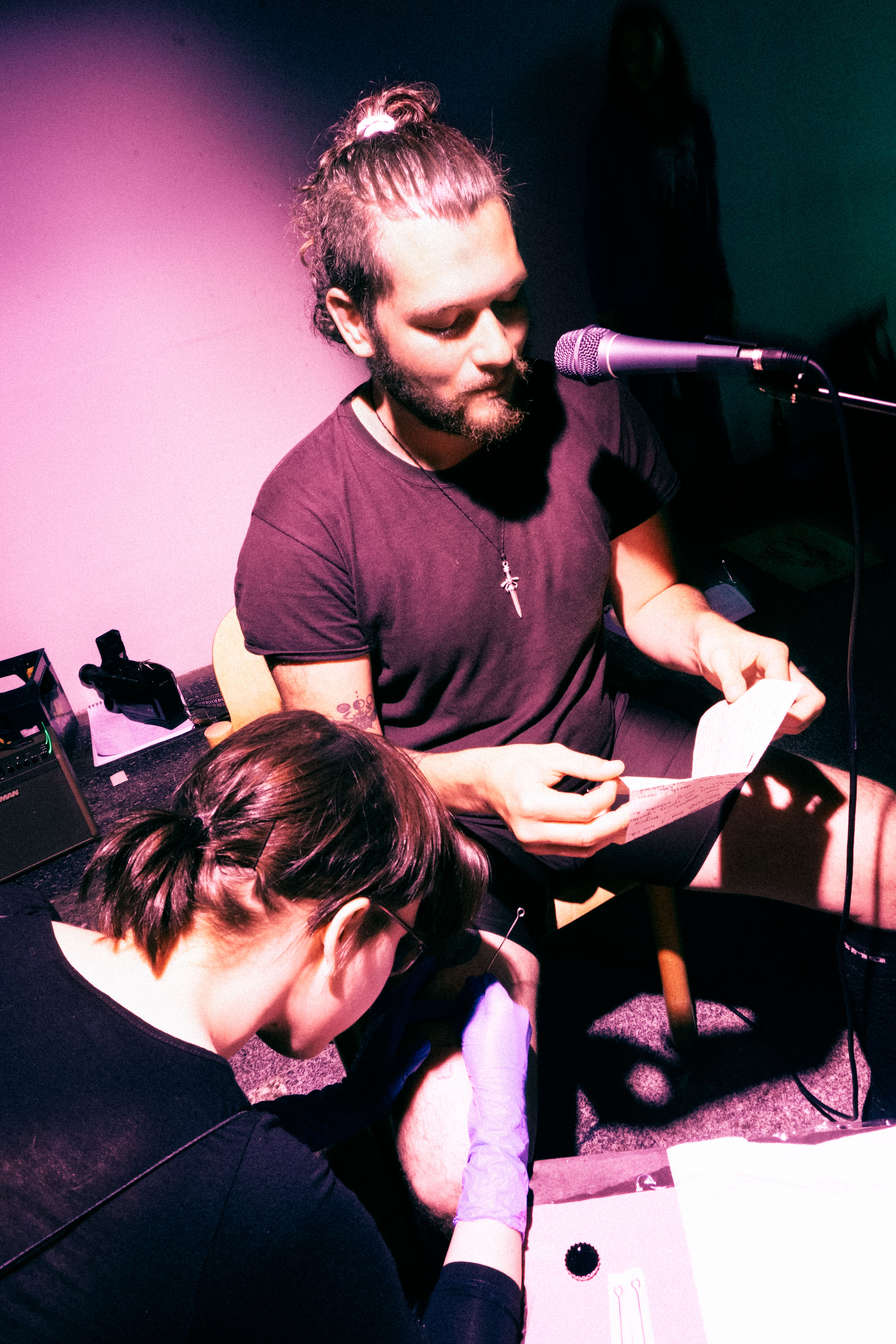
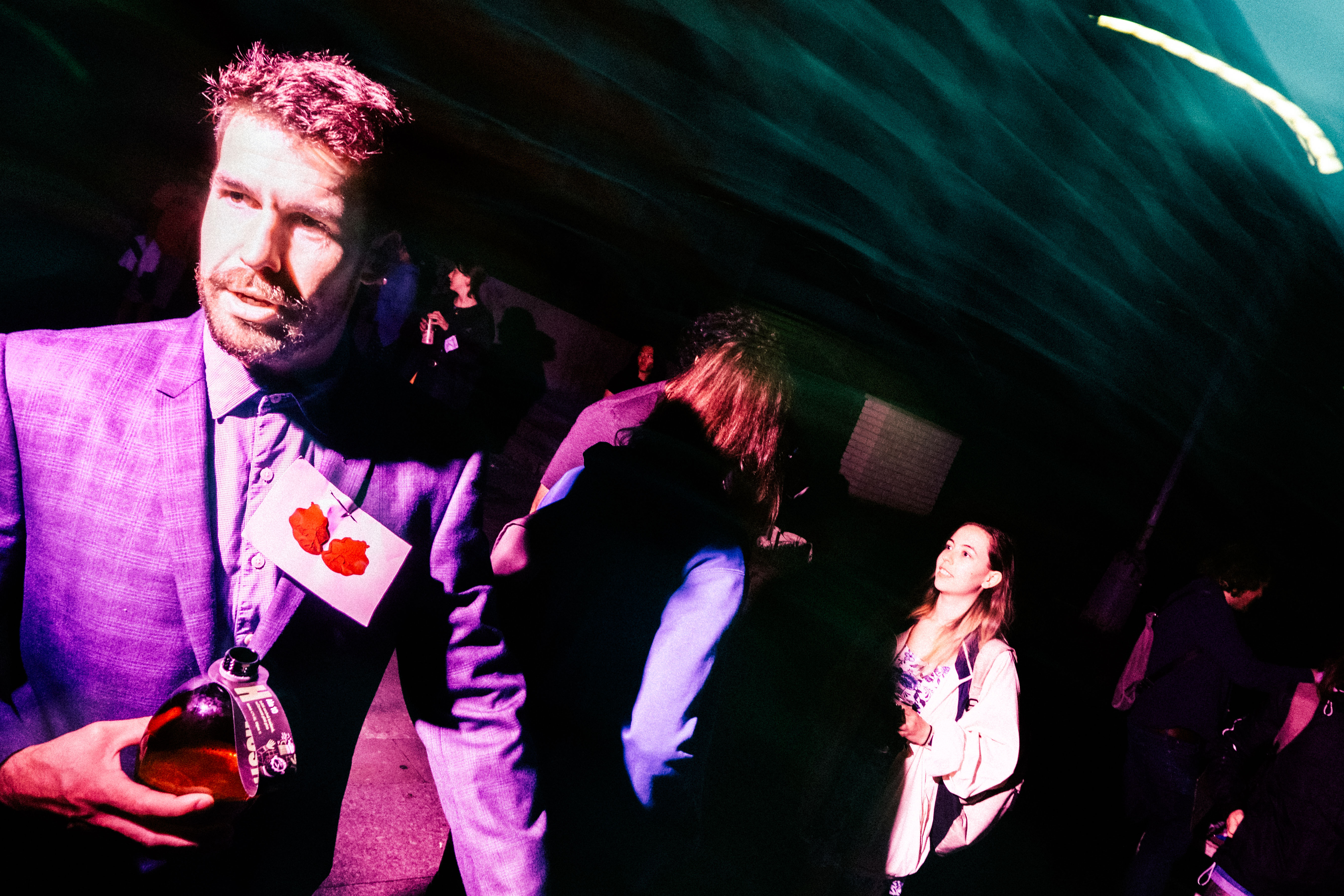


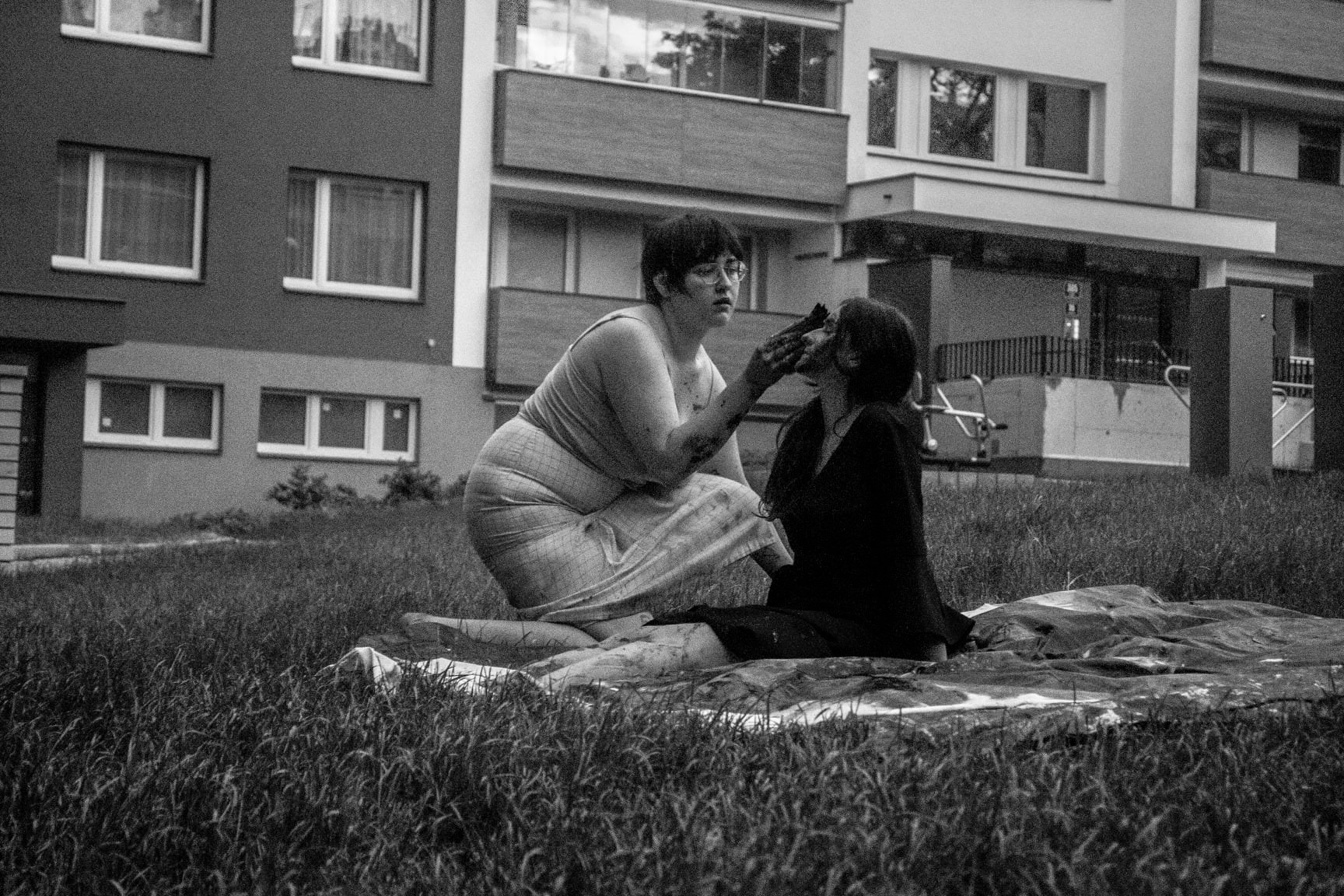


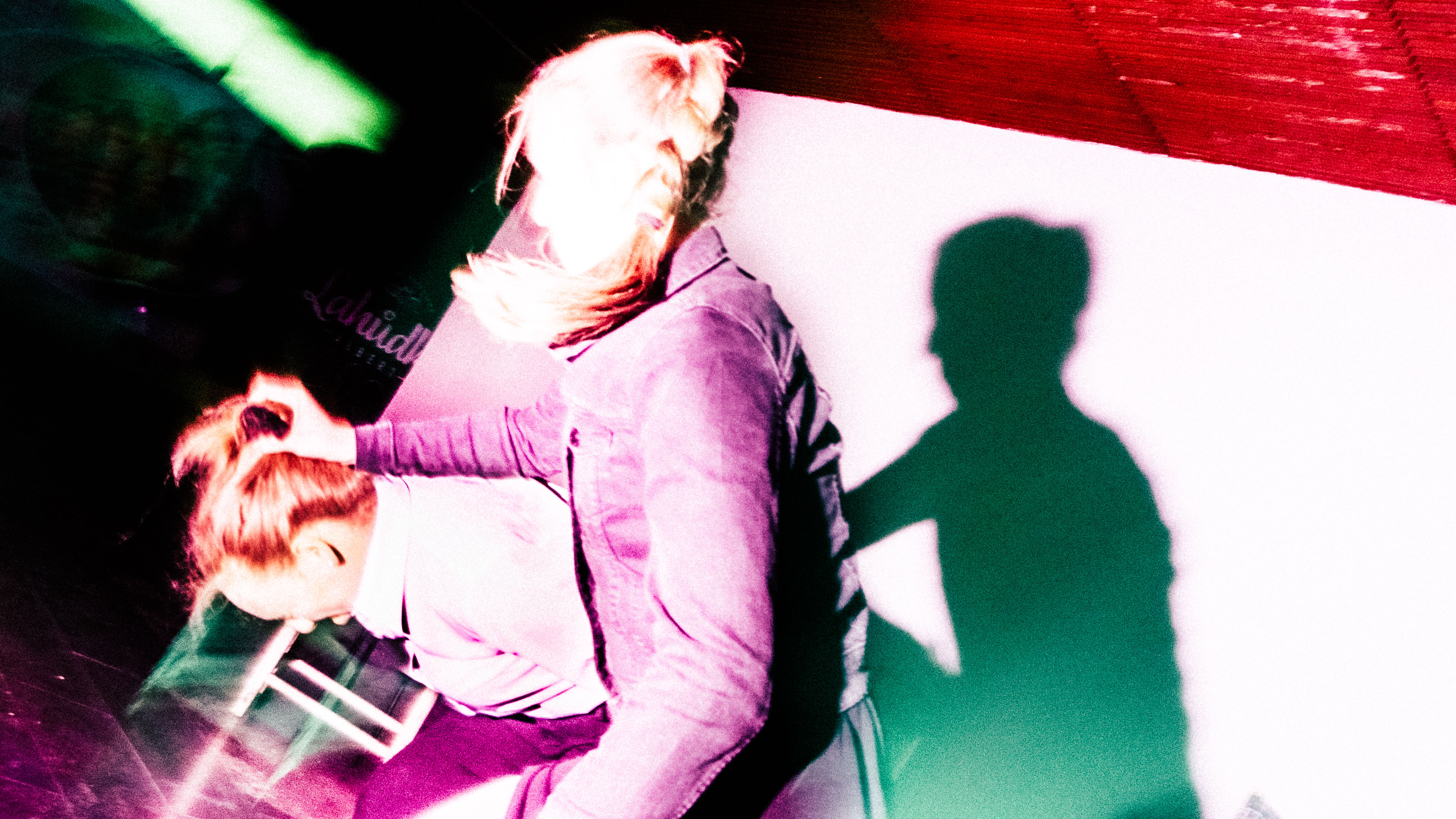


We want to give a big thank you to everyone who made this event possible: crew, production, readers, musicians, performers, and most of all, the audience members. Without you all we could not have had such an enriching language experience.
Readers
Tyko SayYeva Kupchenko
Honza Dibitanzl
Thor Garcia
Michael Rowland
Hunter Andrews
Sandra Pasławska
Performers
Barbora Nechanická,Simona Rozložníková
Mary Palencar
Aaron Barnett
Saksham Sharda
Sylvain Benzakein
Lenka Bodnorová
Sasha Rose
Jaromír Lelek
Sára Drahoňovská
Tyko Say
Musicians
Roksan MandelZoe Perrenoud
Anna Kurkova
Martin Guildenstern